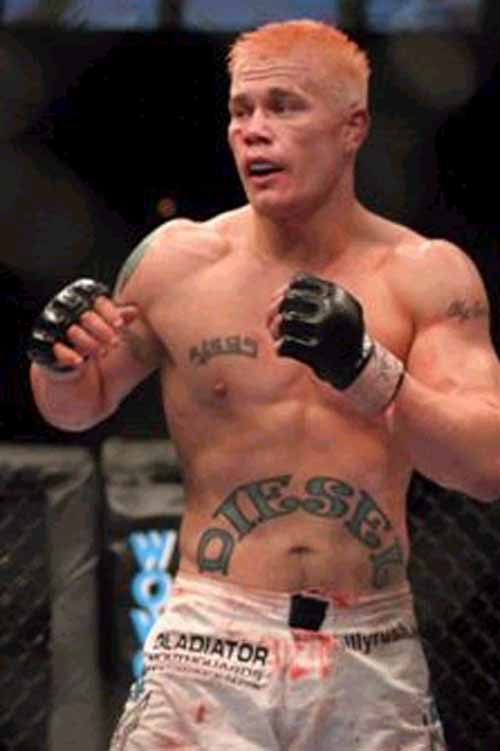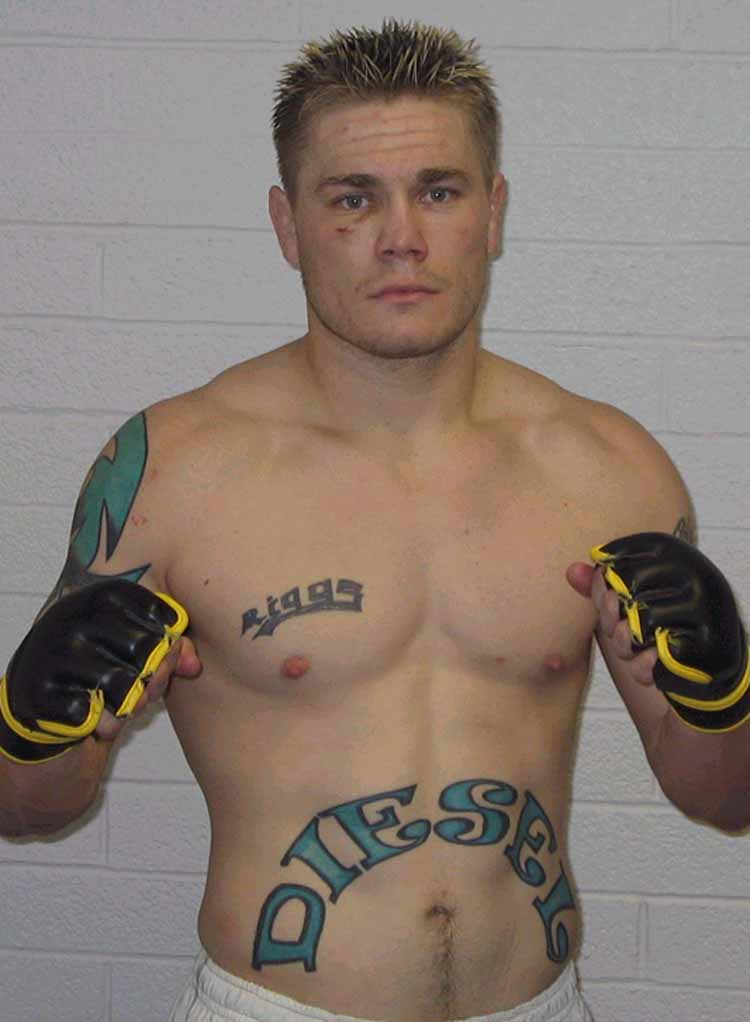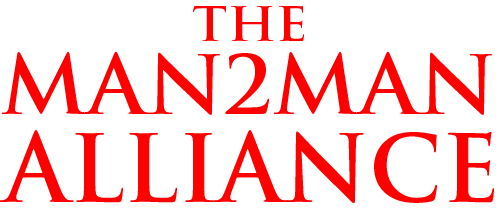




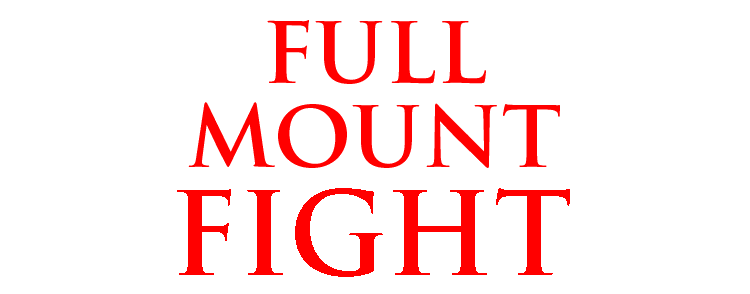
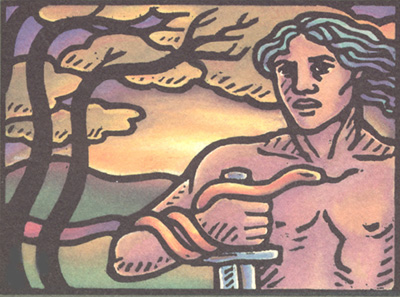


Full Mount Fight
9-12-2007
"She could not even begin to comprehend how or why a male
who loves other men would desire to be masculine instead of
feminine."
~ Robert Loring, She Didn't Understand
I like these pics.
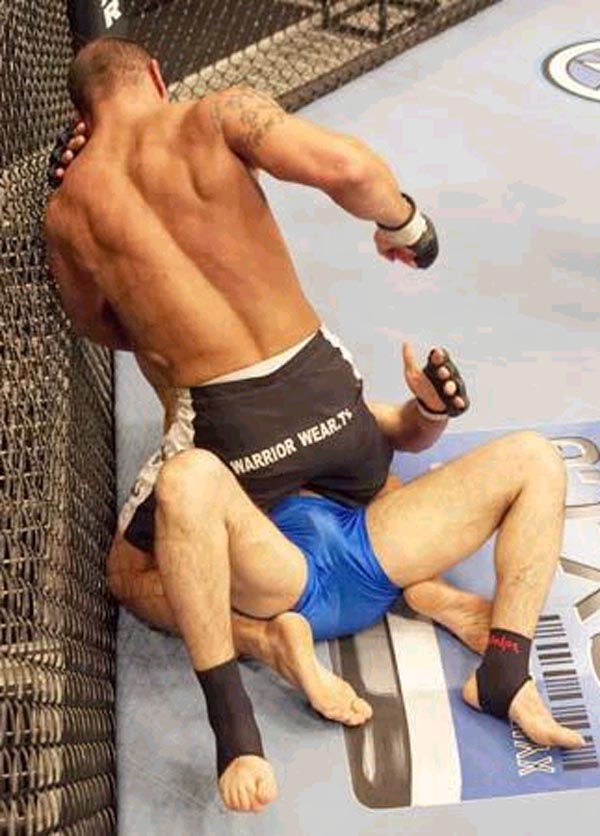
Shows the crotch of the losing fighter up against the ManBalls of the dominant fighter. And the dominant fighter has his ManCock right in the face of the dude taking his fists in the face. The losing Fighter must look at that Cock until he's knocked out or tapped out. It's an "In Your Face" thing only Men would understand.
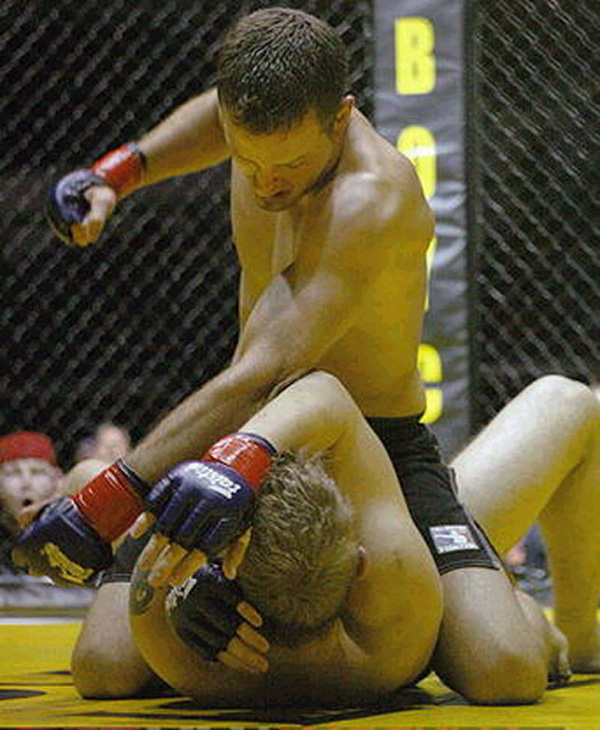
In pure naked Greek Pankration, it represents the climax of the ManFight--both fighters have faced off, naked, right down to their naked genitals, hard cock or not. With the fight taken to the ground, the victorious fighter's Cock and Balls are now in the bloodied face of the fighter he has dominated. It is the climax of the fight.
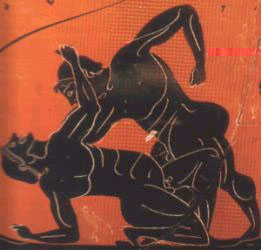
The fought-for-and-achieved victory--as seen, smelled and tasted by the dominant aggressor--is something only a victorious fighter, in the Full Mounted Position, can experience.
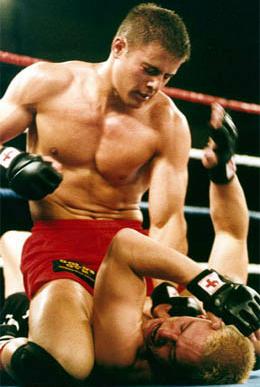
It is this Fundamental, Mythological Human mingling of blood and sweat, in one-on-one hand-to-hand battle which BOTH Men have experienced, which becomes the foundation on which all Free Men stand. Without it, society's freedom drifts away, like a matchstick on the sea, maybe not right away, but eventually it does. Fighting is Freedom; Fighting is Man.

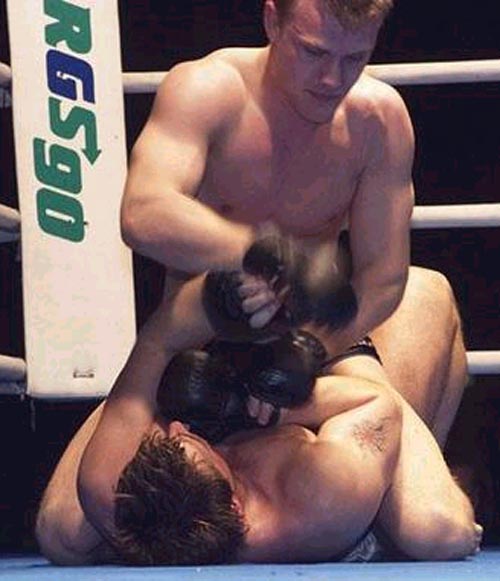

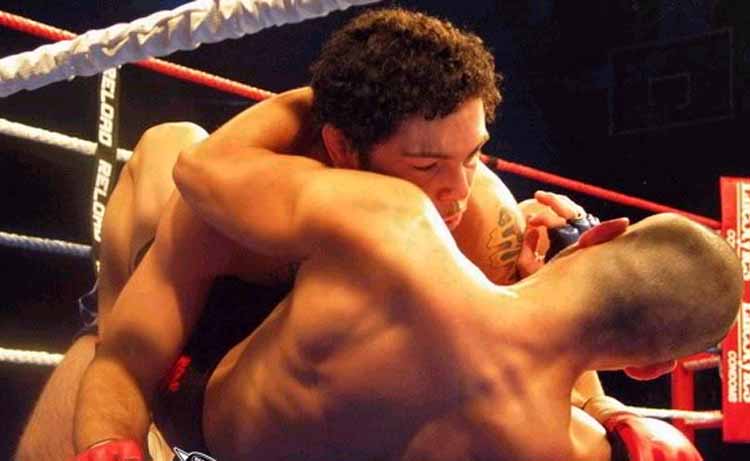

Looking down he sees his fight-partner's face taking ManHits from his fists; The source of the power to hit the bottom man is from that tender-and-tough Cock and Balls he's putting right in the dude's face.
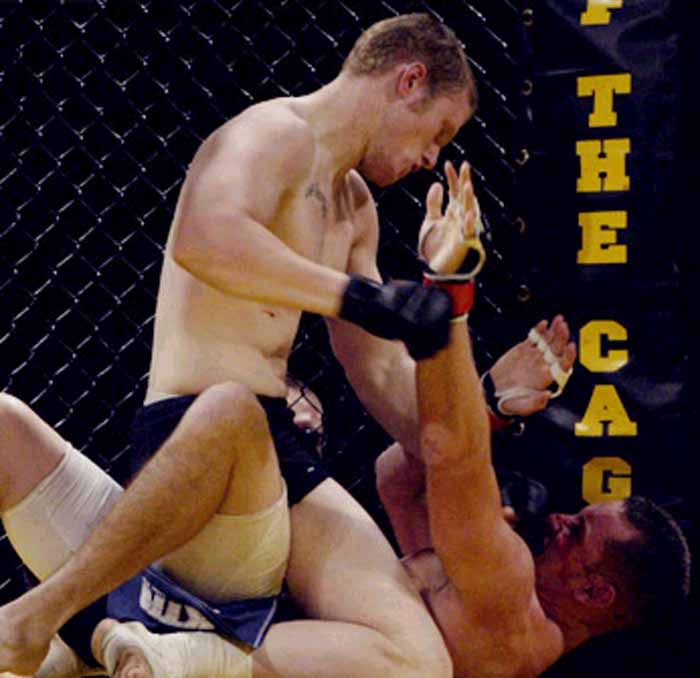
"I've risked my ManBalls and Cock to fight you, and now I put it all in your face as I finish beating you up."
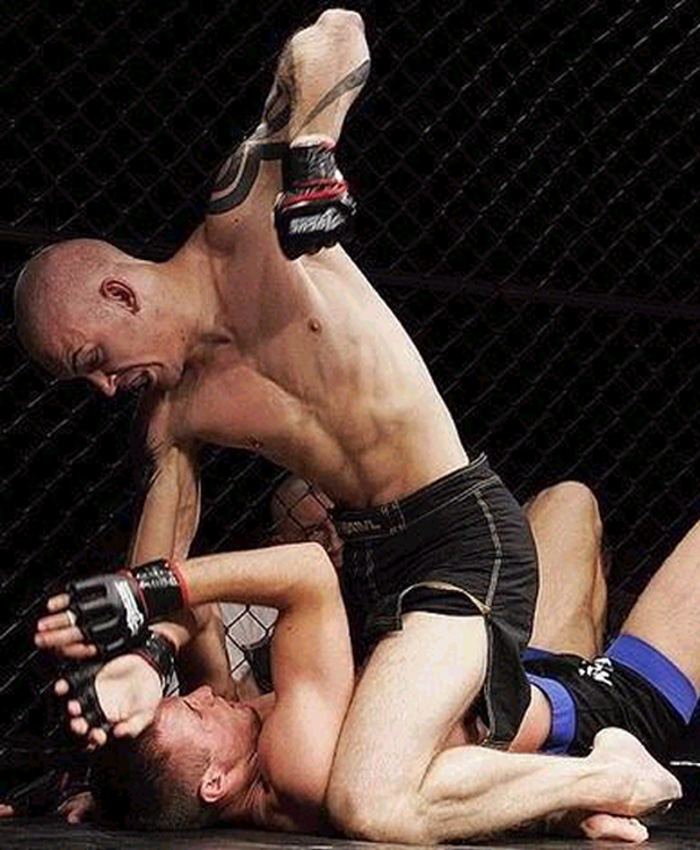
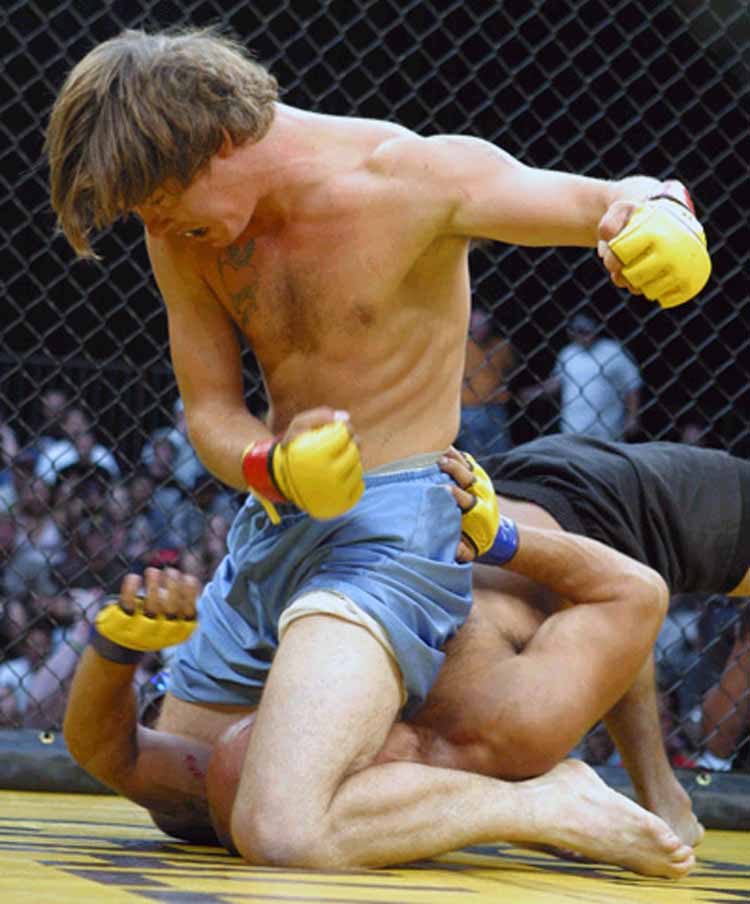
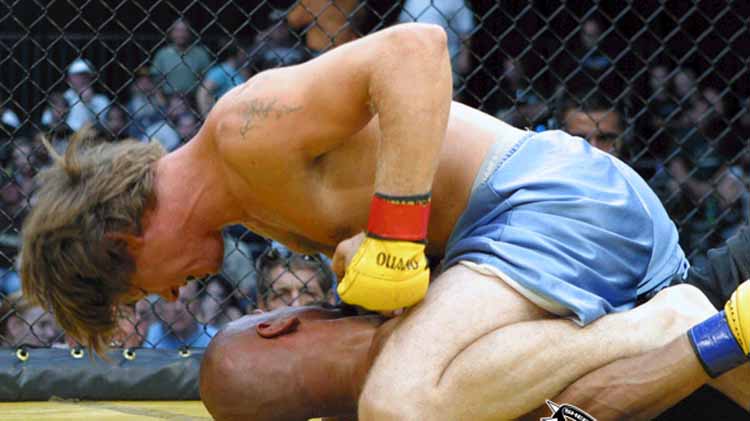
It IS the Beauty of Males to fight, and to fight naked. Indeed Warfare itself is inherently a naked endeavor. Fighting naked (or at least shirtless) is essential for the full Male2Male aggression experience.
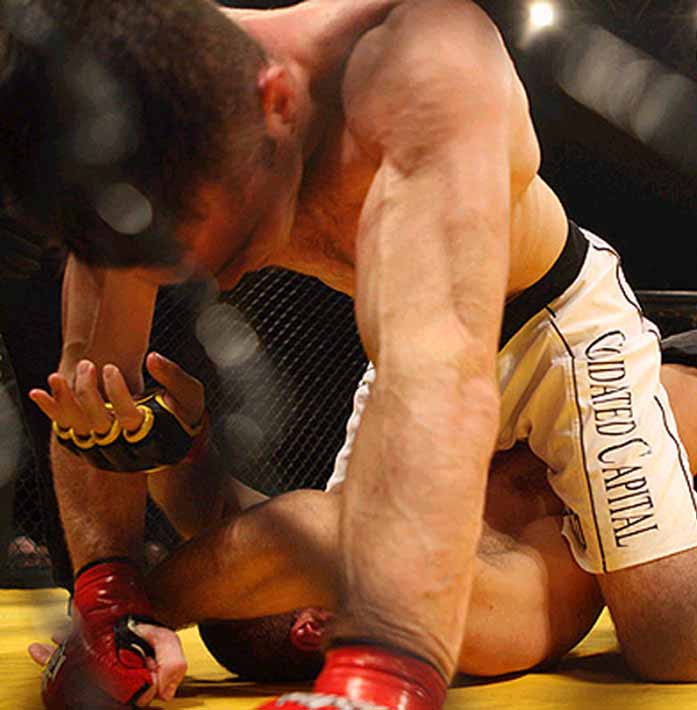
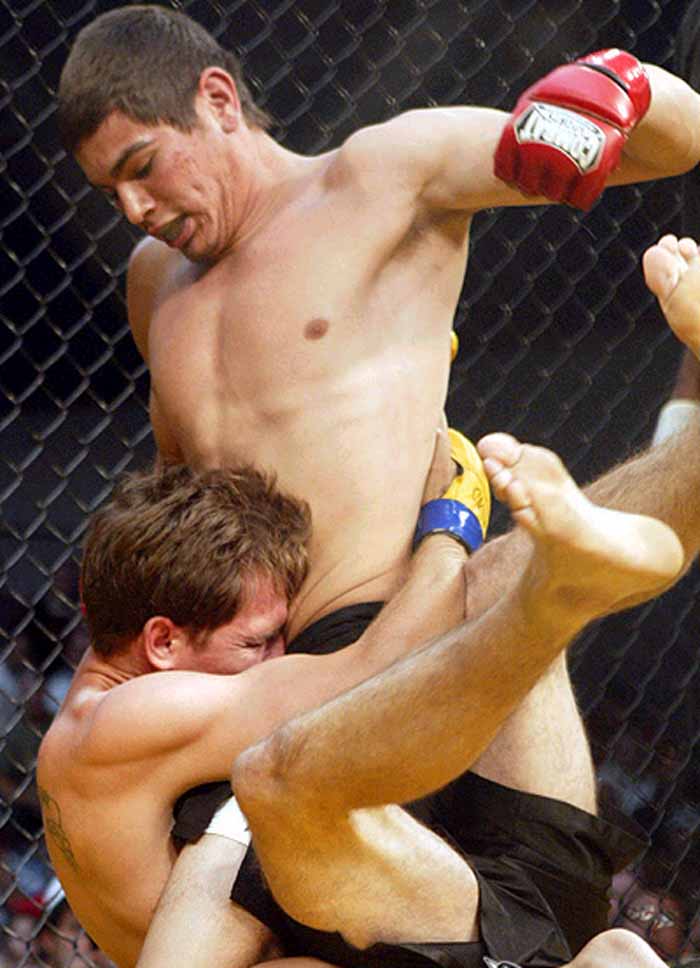
Both of these normal male aggressors have faced the danger of the fight. One Man has dominated. Both will have achieved ManFriendship from it.
ManFriendship.
Brotherhood.

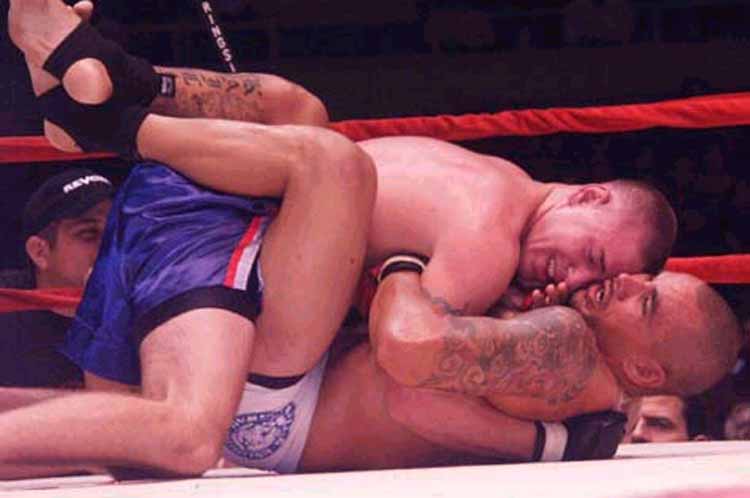
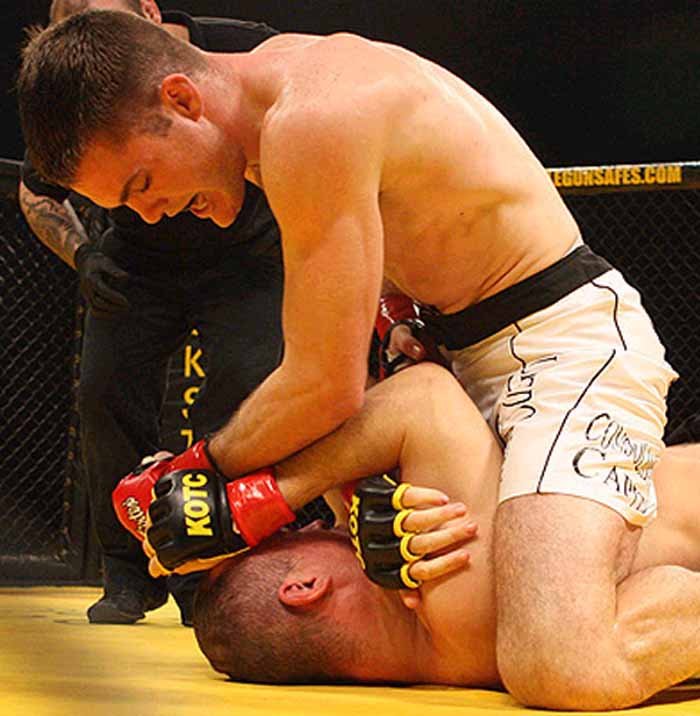
That would HAVE to give a Winning, Victorious Fighting Man a boner to completely show to his male peers...A Trophy.
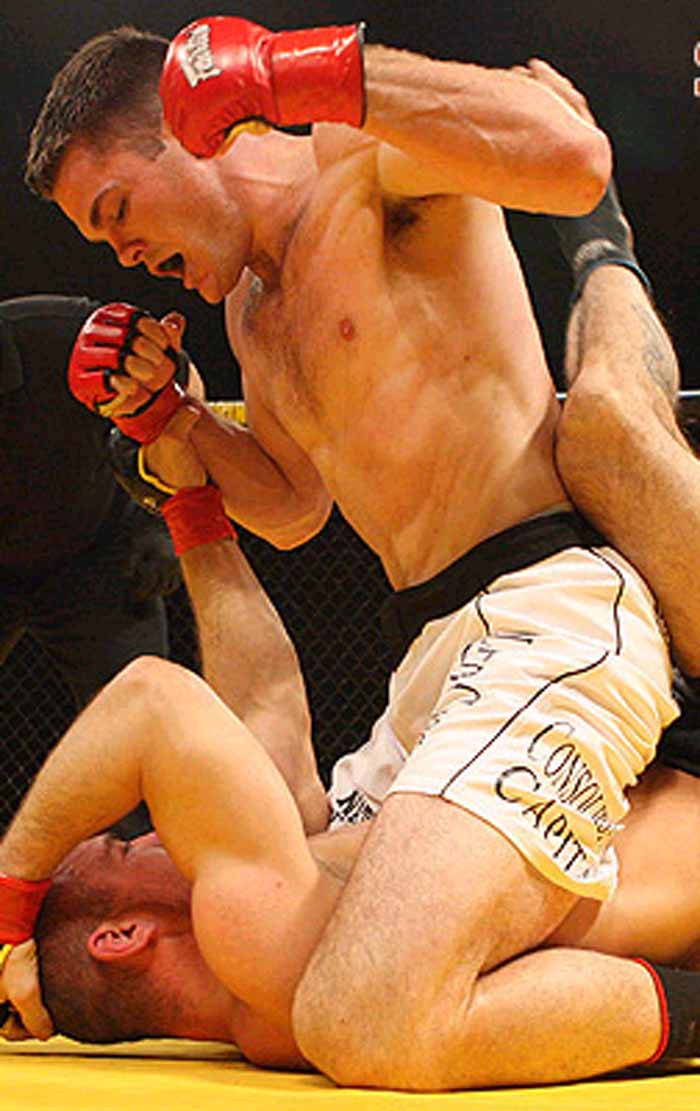
Victory, like Freedom itself, is not free. The price is blood, and sweat, and pain.
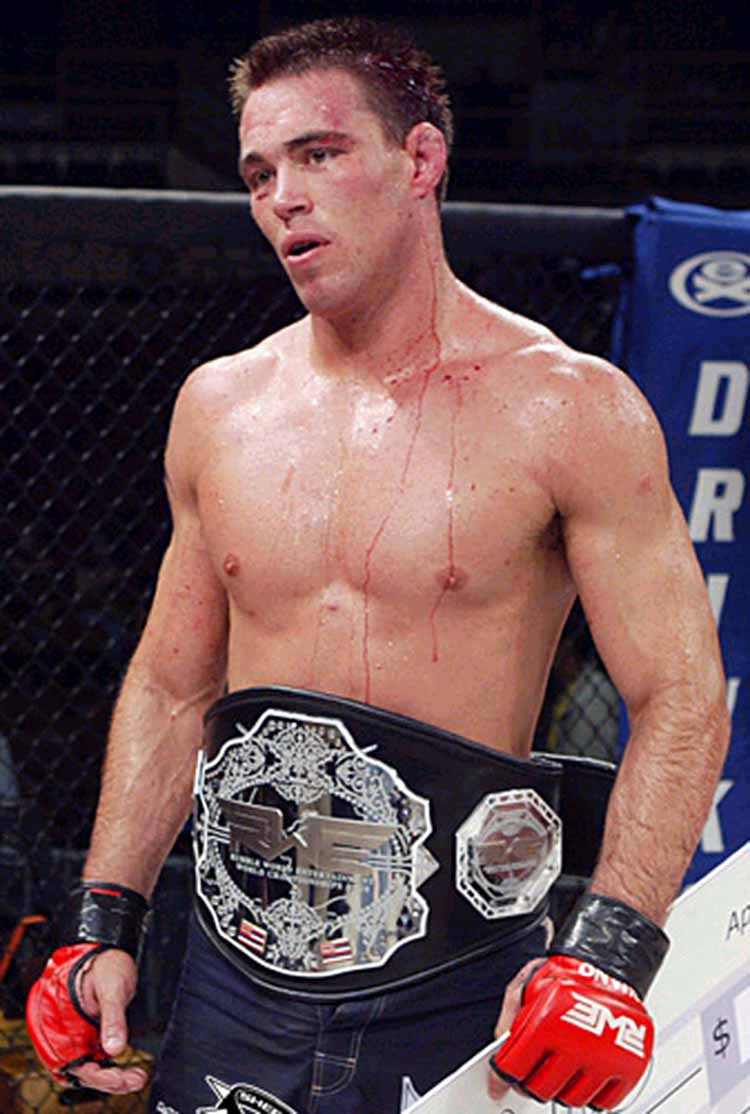
The Fight Sport reminds and recalls the males to that very important fact. The Phallus is the trophy males wear, like it or not, for having the Desire as well as the Responsibility to fight for that ever-threatened Freedom.
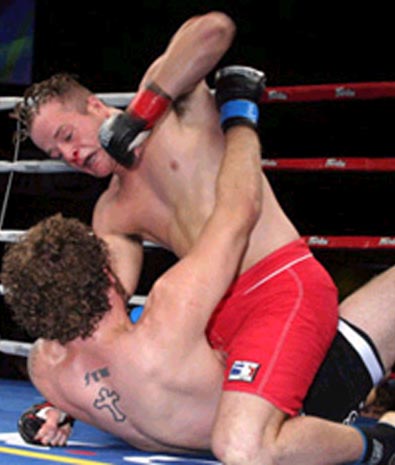
Ancient Greeks--The Founders of Western Civilization and its Individual Freedoms--clearly understood that.
Courage. Sweat. Blood. Risking the vulnerability of the ManBalls and ManPenis, totally naked in the fight. Only one Man can win a Fight.
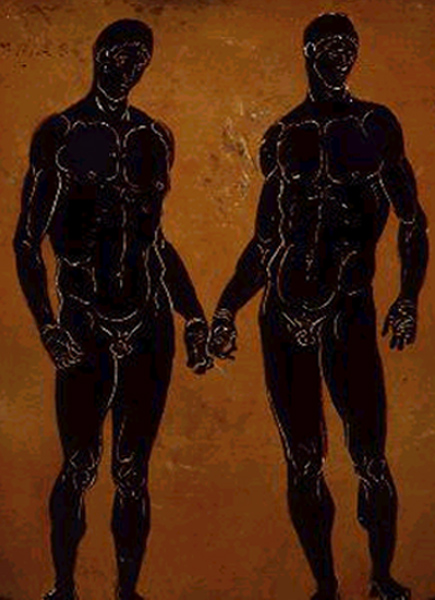
Cool stuff. It's what gave me a boner watching boys fight on the grass at grade school.
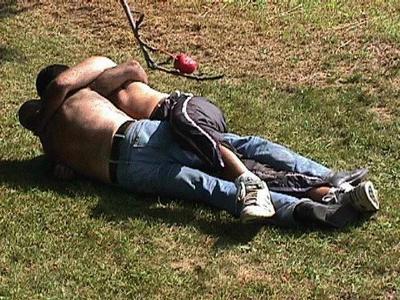
And I'm now convinced I was NOT alone.
When you dig deep down, you realize that this bloody, sweaty aggression is very good; and it is very male to be attracted to doing it, as well as being attracted to watching it.


Naked Wrestler
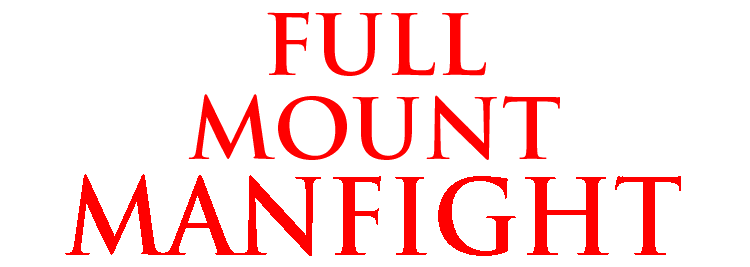
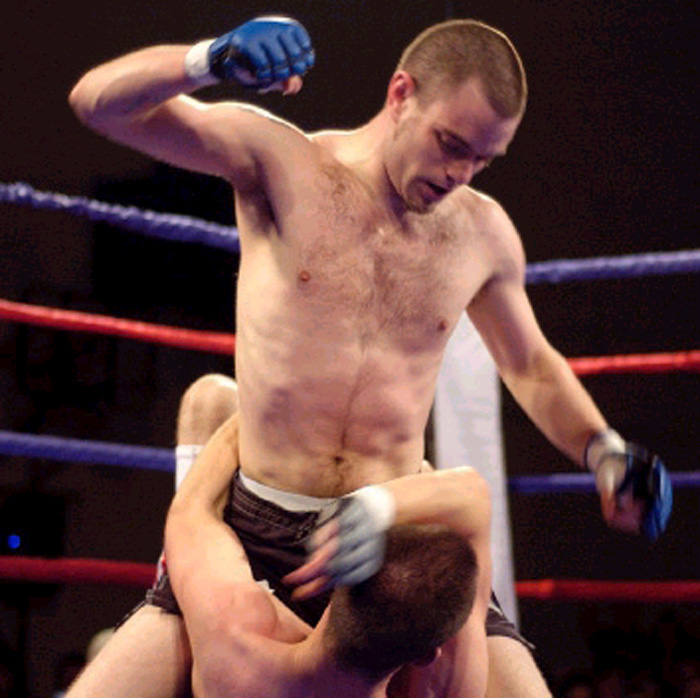
Re: Full Mount Fight
10-1-2007
Thank you Naked Wrestler.
Naked Wrestler aka NW, a former collegiate wrestler and Gay Games competitor who now trains in mixed martial arts / UFC style Fight Sport, is the author of many articles on this MAN2MAN Alliance site, including aggression and the beauty of guys, and The Warrior Male.
NW's work is excellent and highly recommended.
NW says:
It is this Fundamental, Mythological Human mingling of blood and sweat, in one-on-one hand-to-hand battle which BOTH Men have experienced, which becomes the foundation on which all Free Men stand. Without it, society's freedom drifts away, like a matchstick on the sea, maybe not right away, but eventually it does. Fighting is Freedom; Fighting is Man.
That's all correct.
He also says,
It IS the Beauty of Males to fight, and to fight naked. Indeed Warfare itself is inherently a naked endeavor. Fighting naked (or at least shirtless) is essential for the full Male2Male aggression experience.
He's right there too.
Because Men need skin-on-skin contact.
That's a male need.
A necessity.
A necessity which is physical, psychological, and spiritual.
Men need the skin-on-skin experience of the bodies of other men, not as passive sex objects, but as MEN -- aggressive, FIGHTING, MEN.
Men need the skin2skin contact of FightSport -- of ManFight.

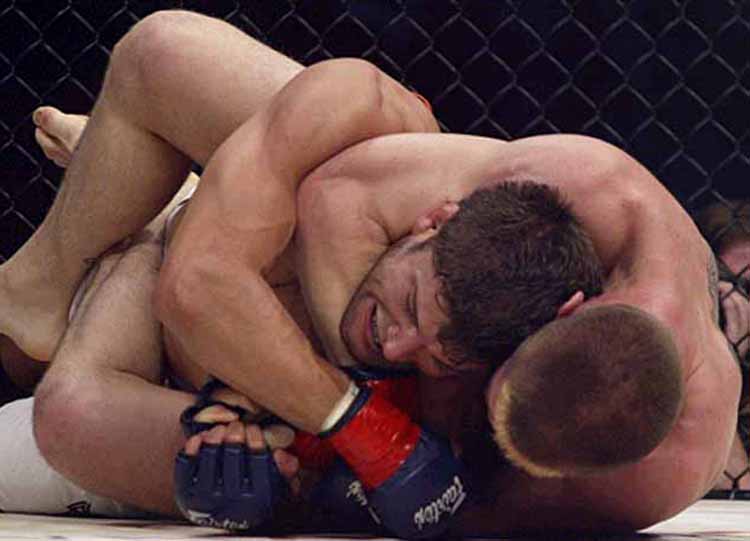

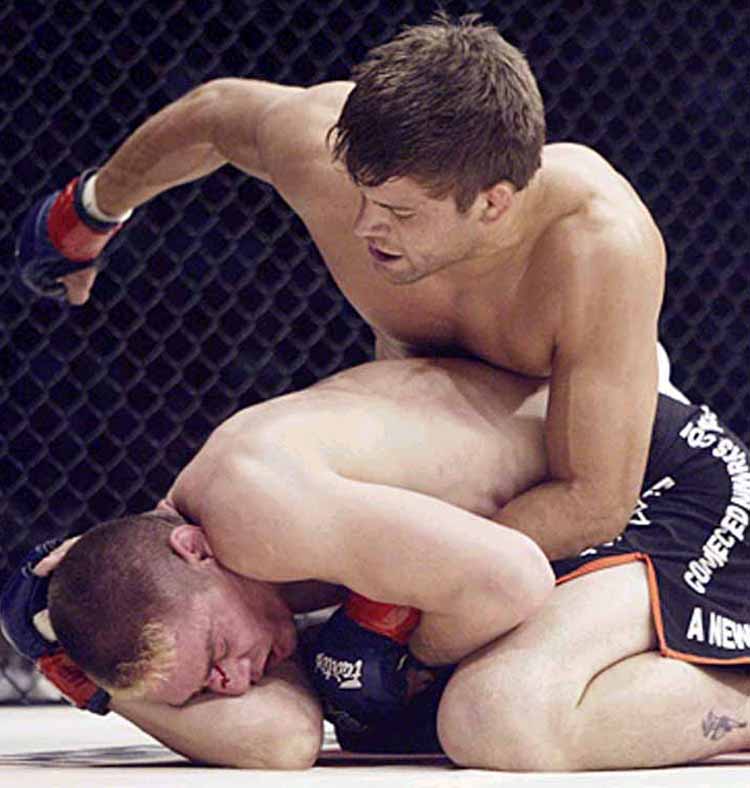

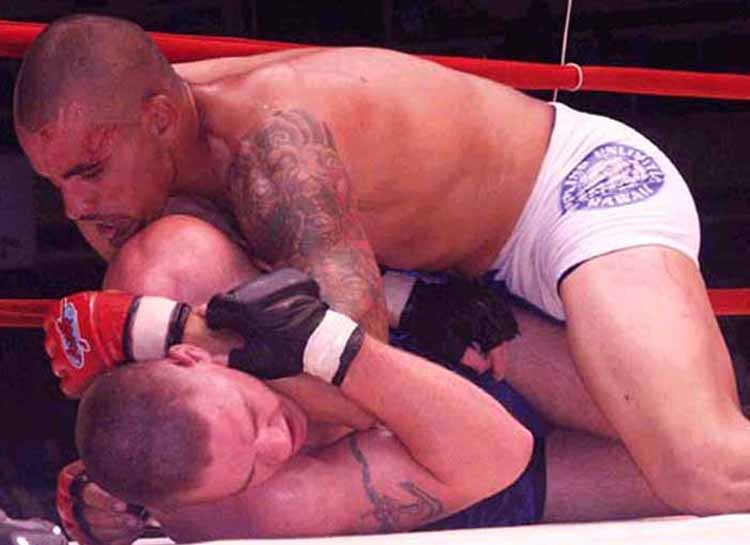

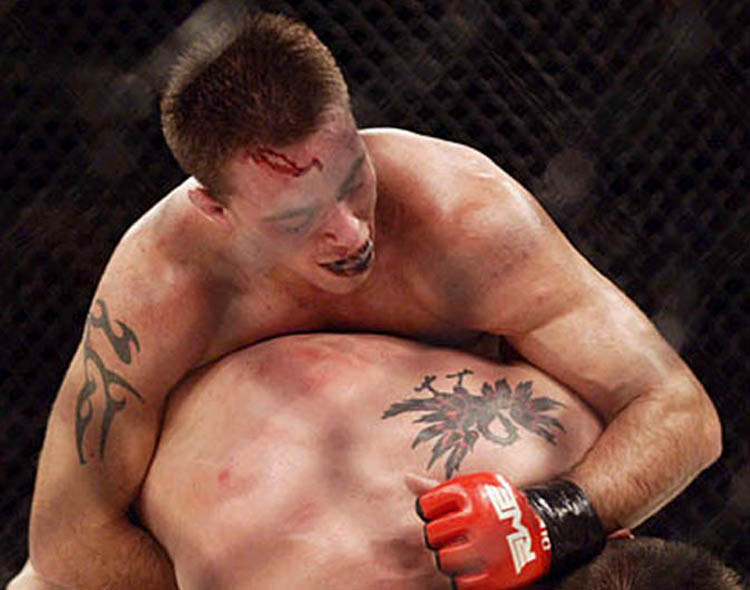

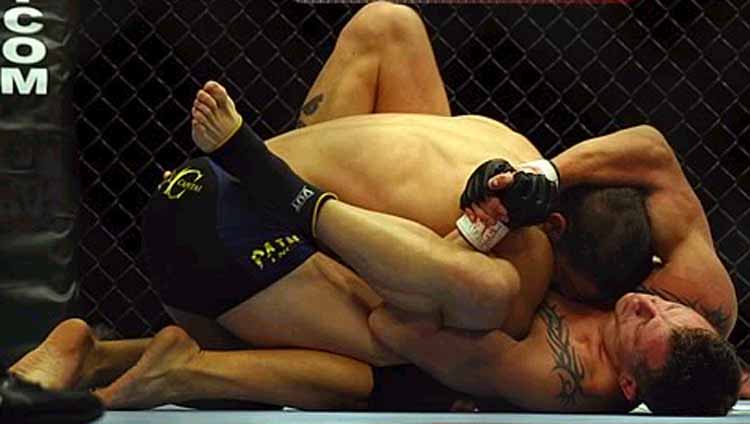

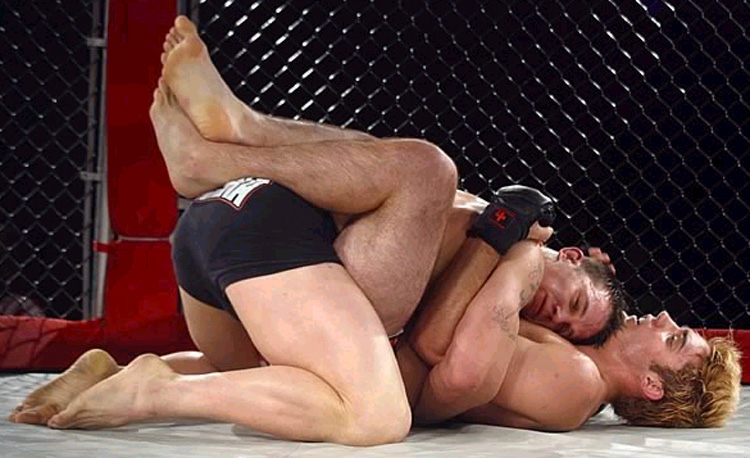

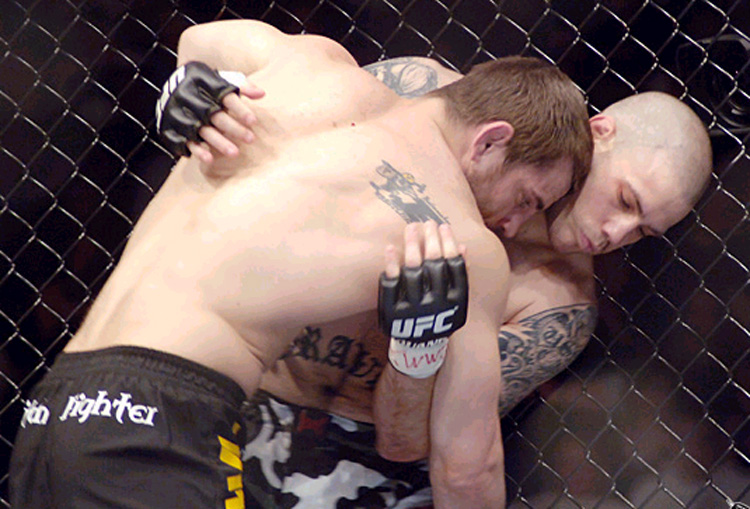
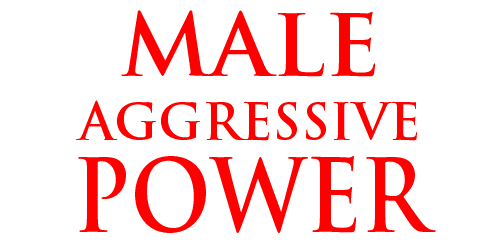
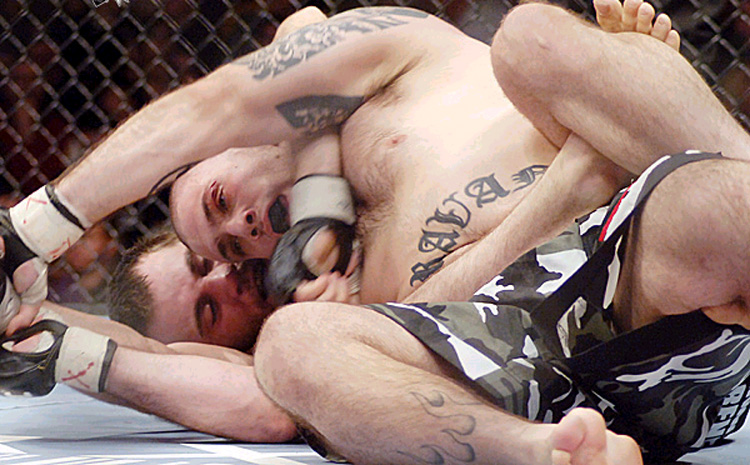
Aggression.
Male Aggressive Power.
MEN need to experience Male Aggressive Power -- their own, and that of other MEN -- skin-on-skin.
ManFight is skin-on-skin.
Men need ManFight.
Men need ManSkin.
That's the problem with coed wrestling.
It's not just the gender issue.
It's the taking from males of the Aggressive ManSkin-on-ManSkin ManFight experience.



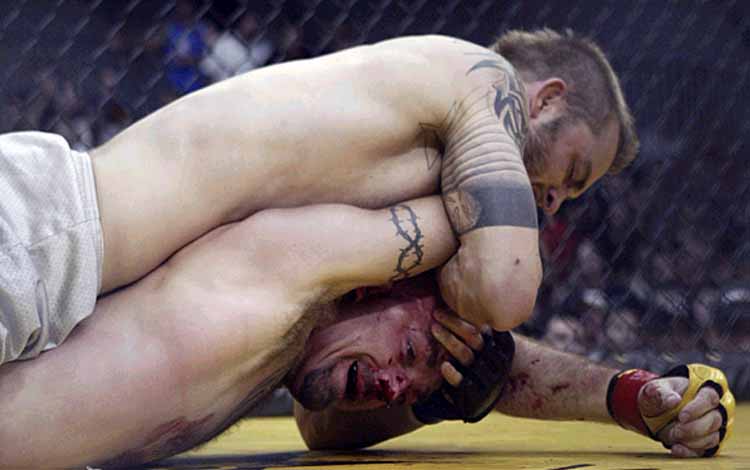
For Men, that's a crucial part of the Fight.
Once again:
MEN need to experience Male Aggressive Power -- their own, and that of other MEN -- skin-on-skin.
Once again:
For Men, that's a crucial part of the Fight.
And it's uniquely Male.
Male-male skin-on-skin is different from male-female skin-on-skin.
Way different.
Yet in the name of gender equity -- which is really just heterosexualization -- Men are being deprived of that.
The genderists want a unisex and effeminized world in which males have been un-Manned and de-Masculinized.
So that just as the genitals are being divorced from sexuality, aggression is being divorced from the male.
It's not an accident that those two separations are occurring simultaneously.
Remember that Aggression is necessary for the True and Natural Attraction of Man for Man.
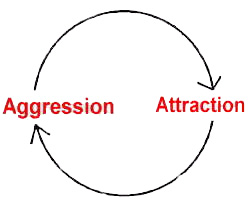
Which is why I said that Men need the skin-on-skin experience of the bodies of other men, not as passive sex objects, but as MEN -- aggressive, FIGHTING, MEN.
The destruction of the Male's Natural Aggression also destroys the Male's Natural Sexuality -- what we sometimes refer to as his natural male sex aggression; and leads directly to the mutilated, negativised, and UNnatural expression of male-male attraction which we know as analism.
Under heterosexualization, then, and simultaneously:
- Same-gender / homosocial spaces are destroyed;
- Attributes viewed as feminine are consistently favored and attributes viewed as masculine, particularly aggression, are incessantly denigrated; and,
- Same-sex affection and intimacy are medicalized and marginalized and thus isolated from the mainstream of society;
resulting in the cultural dominance of the categories known to us as sexual orientation, which in turn further isolate same-sex affection, and severely distort or simply destroy outright the True Love of Man for Man.
That's what happens.
I said these forces act "simultaneously."
That doesn't mean instantaneously.
But over the course of the last 150 years, for example, what we can see is the steady destruction of homosocial spaces; the medicalization of "homosexuality," which begins in 1869 but gathers immense force in the twentieth century; and, similarly, a Women's Movement which begins in the nineteenth century and becomes increasingly powerful as the twentieth century moves forward.
And it's the Women's Movement, in its most extreme form of gender feminism, which takes unrelenting aim at Masculinity and Male Aggression, while forging an alliance with the "gay movement," an alliance which again acts to undermine traditional norms of male-appropriate behavior.
Including fighting.
We discuss these aspects of heterosexualization in more depth in Warriorhood and Male Intimacy; please read that post if you haven't already.
So: the historic, traditional, and cross-cultural skin-on-skin aspect of Fight Sport is not incidental.
And it's part of the reason that as society heterosexualizes, Fight Sport becomes increasingly marginalized.
At the moment, to be sure, UFC / Mixed Martial Arts is enjoying great and what appears to be growing popularity among certain age groups and social classes, even as significant segments of society, including the mainstream press, remain consistently suspicious of it.
Whether the popularity will last -- I cannot say.
But I'm not optimistic.
For one thing, there have been other periods within recent history, that is, within the last hundred years, when Fight Sport, particularly boxing, has fallen into, only to fall out of, favor.
So we need to consider why UFC is popular at this moment.
Probably, and just because, there have been so many attacks on what I'll call classic male fighting, in a society in which it's increasingly difficult and suspect for kids, let alone Men, to fight.
John Ibson, whose book Picturing Men: A Century of Male Relationships in Everyday Male Photography, we discuss in Warriorhood and Male Intimacy, notes that in the late 19th century, as masculinity and all-male spaces came under increasing attack, there was what he refers to as an "unprecedented affection for boxing."
Ibson:
As the cities and machines of a modernizing America became ever more significant in society and culture ... it seems clear that there was a widespread male yearning for something other than what modern life had to offer.
...
[There was, according to John Higham,] a widespread and "profound spiritual reaction" against the commercialization and mechanization of American life. "It took many forms," wrote Higham, "but it was everywhere a hunger to break out of the frustrations, the routine, and the sheer dullness of an urban-industrial culture." Add to this the increasingly rapid replacement of men's self-employment with wage labor and the growing and sometimes successful demands of women for wider political and economic participation. ... If not actually in "crisis," many American men nonetheless were far from satisfied in turn-of-the-century America.
Ibson then discusses Theodore Roosevelt, who'd reinvented himself, going from effete rich boy to the "Cowboy of the Dakotas" and leader of the Rough Riders:
We should not ... ignore the critique inherent in Rooseveltian masculinity. In "The Strenuous Life," after all, TR had denounced "the base spirit of gain" that pervaded American society. For all of his popularity, Roosevelt was a man profoundly at odds with the commmercialism and standardization that were coming to dominate American life.
And, I would add, that distaste for commercialism and standardization well predates Teddy Roosevelt.
Here are some quotes from Henry David Thoreau, who died in 1862 -- a full forty years before Roosevelt's presidency:
- Men have become the tools of their tools.
- Most are engaged in business the greater part of their lives, because the soul abhors a vacuum and they have not discovered any continuous employment for man's nobler faculties.
- Money is not required to buy one necessity of the soul.
- The price of anything is the amount of life you exchange for it.
- There is no value in life except what you choose to place upon it and no happiness in any place except what you bring to it yourself.
So the so-called Rooseveltian distaste for "commercialization and standardization" and "the base spirit of gain" is actually something that's been part of American culture -- and I would suggest -- *Natural* Masculinity -- for a very long time.
A very very long time.
After all, Sparta too was opposed to "commercialization and standardization" and "the base spirit of gain."
And these quotes from Thoreau --
- Money is not required to buy one necessity of the soul.
- The price of anything is the amount of life you exchange for it.
- There is no value in life except what you choose to place upon it and no happiness in any place except what you bring to it yourself.
-- could just as easily have appeared in Plutarch's Sayings of the Spartans.
So, this opposition to the base spirit of gain, which stems from the Warrior impulse and specifically from Warrior altruism, is not something new in human affairs.
Nevertheless, what Ibson's showing us is a picture of an America at the turn of the 20th century that's in many ways similar to America at the turn of the 21st century.
Except of course that heterosexualization and industrialization -- which in our time takes the form of high tech -- in the year 2007 is far MORE advanced than it was in 1907.
Which means that the war upon Natural Masculinity is far more advanced.
I'll have more to say about these issues in a forthcoming post.
Because it's really key that we understand the difference between social or, as I call it, pseudo-masculinity, and Natural Masculinity.
Natural Masculinity is what Men like Roosevelt and Thoreau were after -- and which they understood to be under attack by commercialization and industrialization and standardization.
So we really need to understand that, and understand that heterosexualization itself is UNnatural; and that, as my foreign friend says,
it was only through the financial and technological power brought by industrialisation that western society could create such an artificial unnatural heterosexual environment.
Now, Ibson says that at that first turn of the century, there was "an unprecedented affection for boxing."
When he says "boxing," he's referring to boxing qua sport.
It's not that men and boys didn't fight -- that is, throw punches and wrestle -- as part of everyday life, as they have so fought for millenia.
It's that in a time of shrinking perspectives and possibilities for Men, boxing as a sport became very attractive.
Ibson:
As Leonard Ellis has observed, the "ring obliterated the very structure of 'civilized' competition -- private property, money, and the market; all the squared circle offered as self-realizing competitive activity was the rivalry of abstracted individuals through skilled physical aggression in hand-to-hand combat."
To which I say, No kidding.
I must add that I don't know what Mr Ellis means by "abstracted" individuals.
But what Ellis describes is basically the ancient Greek conception of the athletic contest -- the agon -- which the Oxford Classical Dictionary defines as the strenuous physical effort of one man to overcome another.
"Abstracted" or not.
Fact is, "the rivalry of abstracted individuals through skilled physical aggression in hand-to-hand combat" is a WARRIOR activity and the expression of a WARRIOR ETHOS which is as old as Mankind.
And which is *intrinsic* to Natural Masculinity.
So -- in the late 19th century, as Men felt the increasing threat of separation from their Natural Masculinity, boxing became very attractive.
Something similar is certainly going on today.
But it's more intense, I believe, because it's become less and less socially acceptable for boys and men to fight.
In the most recent NY Times article about Mixed Martial Arts / UFC, Senator Reid of Nevada (the fights were held in Las Vegas), himself a former boxer, remarked
"This is a fair street fight," he said. "When I was a kid, we had street fights, but this reminds me of a street fight that's fair."
That's more or less right -- though we do need to recognize that UFC-style fighters are highly trained and highly skilled -- and in that respect they're certainly NOT street-fighters.
Nevertheless, it is true that Mixed Martial Arts was originally an attempt to reproduce as much as possible the conditions of a "real" fight -- a street or schoolyard fight -- in the ring and cage.
Why would that be necessary?
Because increasingly such real fights are disappearing from real life.
Which is why what we see in Mixed Martial Arts fights is a classic male fight pattern.
Here's a description of the typical "schoolyard fight" from a prosecutor in Louisiana.
Guys, this man is the prosecutor in the Jena case, which is very controversial and has received a lot of publicity.
I am NOT endorsing his view or anyone else's of that case.
What interests me here, and interests me solely, is the language he chose to describe a schoolyard fight:
Conjure the image of schoolboys fighting: they exchange words, clench fists, throw punches, wrestle in the dirt until classmates or teachers pull them apart.
That's right.
And if we remove what the law calls "fighting words" and substitute other fighters for classmates and referees for teachers -- we've got a classic UFC / Mixed Martial Arts fight.
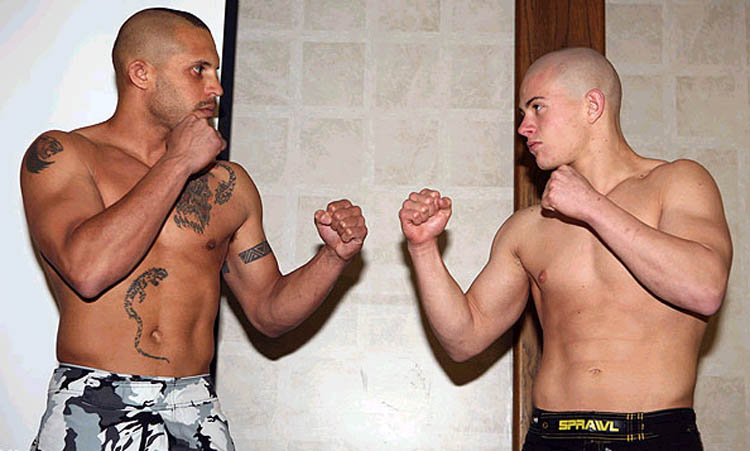
Which is skin-on-skin.
Would the schoolyard fight be skin-on-skin?
Often.
If the guys had time to take off their shirts it would be.
The prosecutor adds that in his jurisdiction, such a fight "would not be aggravated second-degree battery."
Well, he's in Louisiana.
And I'm not by any means presenting Louisiana as a model of enlightenment, because it isn't.
But, as NW pointed out in a previous post, in many places now such a fight would bring about legal intervention.
Which is another fruit of heterosexualization.
Yet, and once again, this is a normal pattern of male-male aggression, and absolutely necessary for the wholesome development of male-male attraction.
Here's how Warrior Lawrence describes such teenaged fights in his memoir of his adolescent love in honor of my cousin/lover/frot brother:
We both tended to be hot-headed and prone to fist-fights with one another (same as when we were 3 years old together) but they always ended with one of us starting to chuckle, resulting in us wrestling down in the dirt laughing. We rarely wore shirts. We worked hard and played hard.
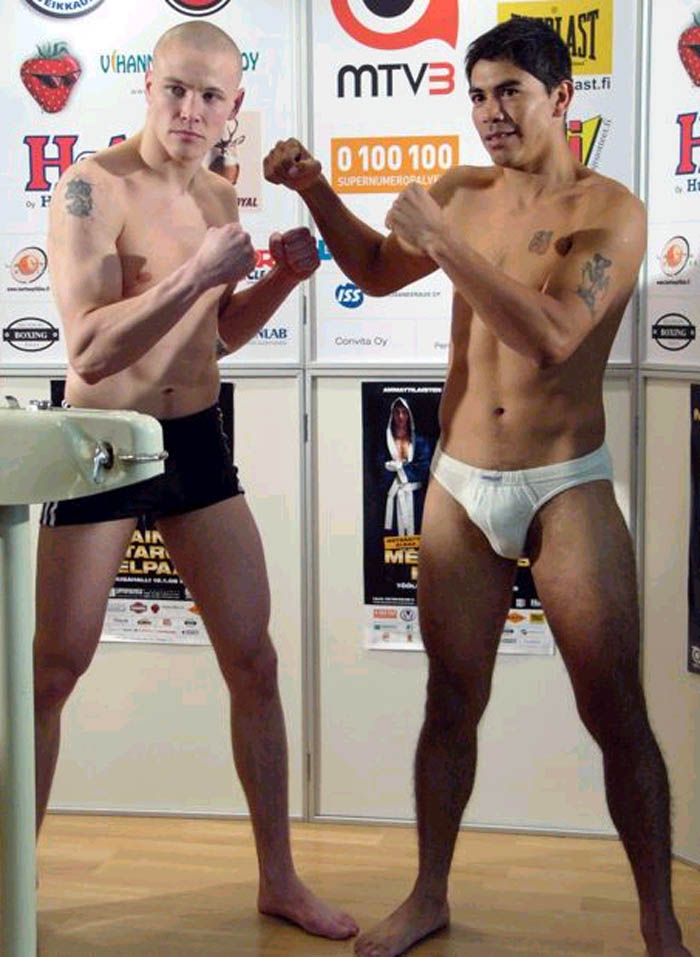
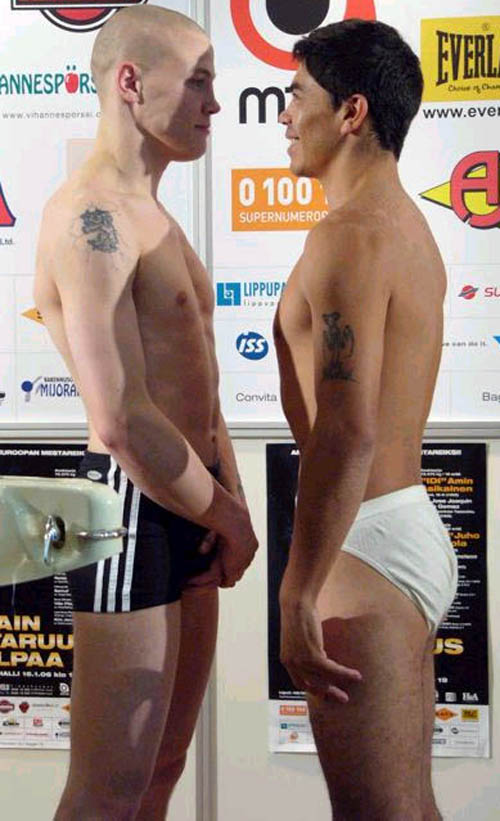
So here are two more boys prone to shirtless fist-fights that ended in "us wrestling down in the dirt together."
Which is what Patrick did when he was wrestlin around with his budz.
What did the prosecutor say?
That schoolboys "throw punches, wrestle in the dirt."
And it's not just schoolboys, or guys in "Western" culture.
Here's a photo from a traditional Yurok Indian festival:
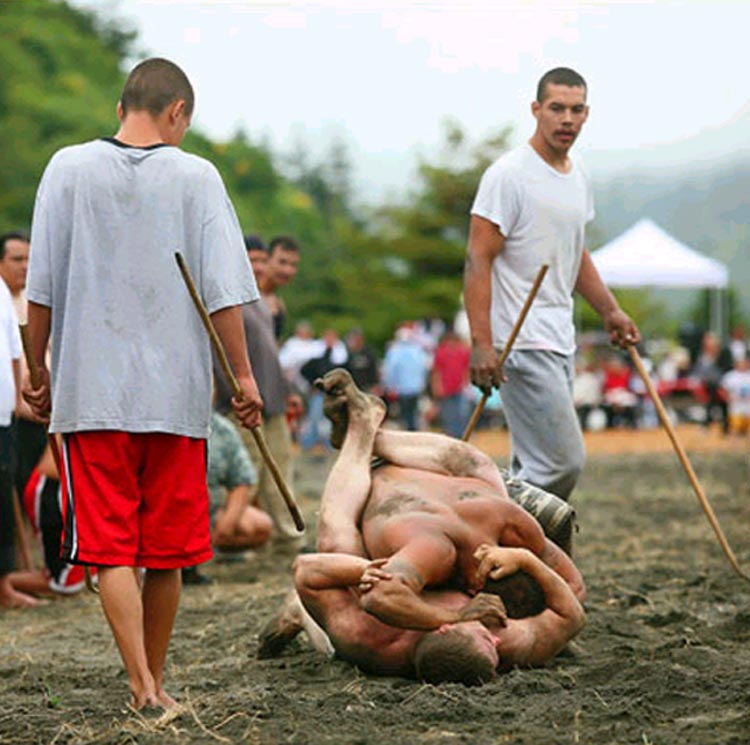
Again, this is something that males do -- fight and wrestle skin2skin down in the dirt -- because they need to do it.
And which heterosexualization seeks to destroy.
Yet, as NW, says, "it IS the beauty of males to fight, and to fight naked ... Fighting naked (or at least shirtless) is essential for the full Male2Male aggression experience."
He's correct.
And notice that he says, it is the *beauty* of males to fight, and to fight naked.
We as human beings experience certain phenomena as "beautiful."
And often -- not always, but often -- that sense of beauty in the event is something which is built-in to the species.
We experience something as beautiful because we know it is fundamentally GOOD.
True.
And important.
And indeed, NW relates this naked, skin-on-skin male-on-male fighting to Freedom:
Victory, like Freedom itself, is not free. The price is blood, and sweat, and pain.
The Fight Sport reminds and recalls the males to that very important fact. The Phallus is the trophy males wear, like it or not, for having the Desire as well as the Responsibility to fight for that ever-threatened Freedom.
Ancient Greeks--The Founders of Western Civilization and its Individual Freedoms--clearly understood that.
Courage. Sweat. Blood. Risking the vulnerability of the ManBalls and ManCock, totally naked in the fight. Only one Man can win a Fight.
When you dig deep down, you realize that this bloody, sweaty aggression is very good; and it is very male to be attracted to doing it, as well as being attracted to watching it.
Let's think about some of this.
"It IS the Beauty of Males to fight, and to fight naked."
The Greeks fought naked.
We have lots of vase paintings

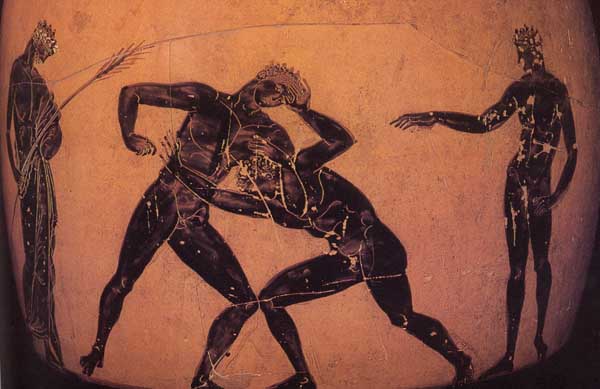
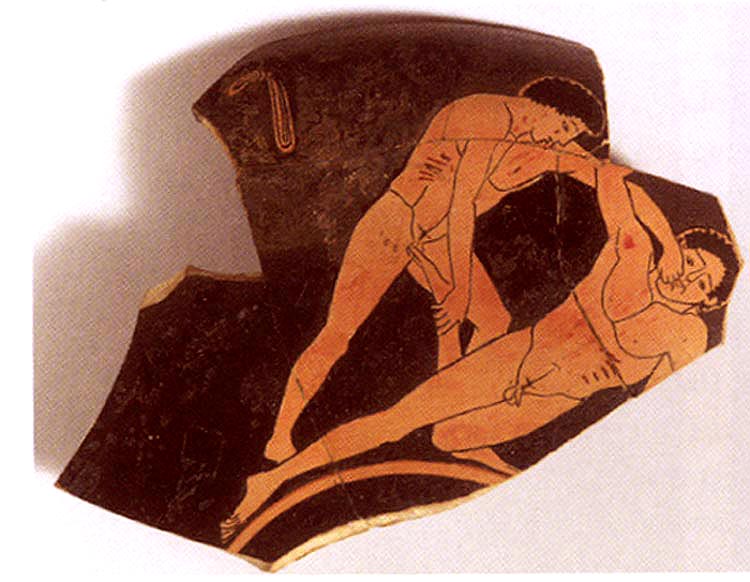
and some sculptural groups
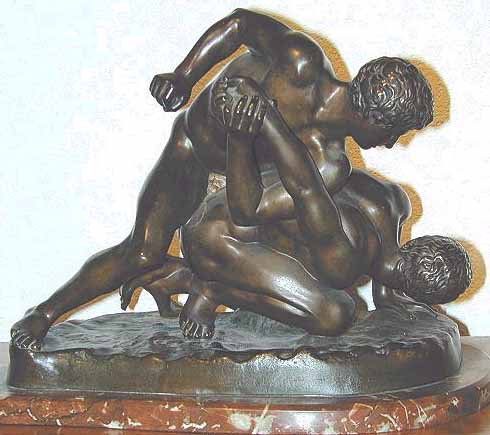
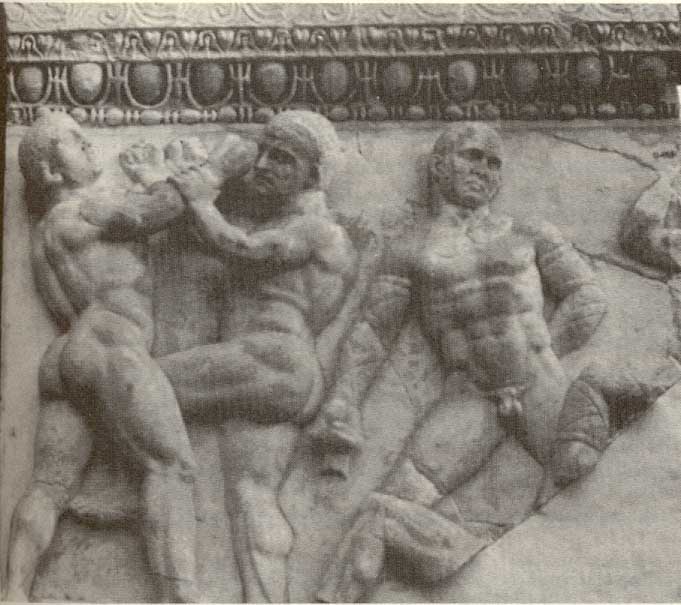
and many individual statues
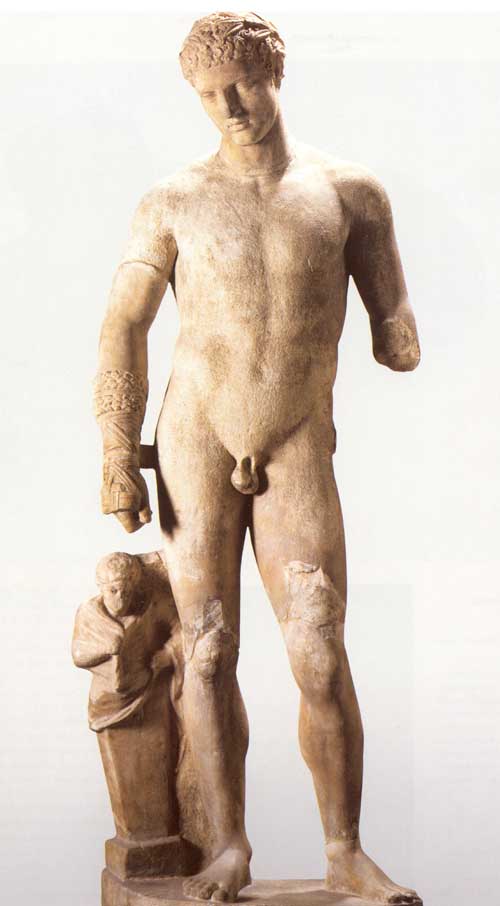
which show that.
But I don't think they pack the same punch, as it were, as a photograph.
So what you need to do is look at these photographs, and imagine these guys are nude:

Nude:

Nude:

Nude:

Nude:

Nude:

Nude:

Nude:

Nude:

Nude:

Nude:

Nude:

That was the ancient experience of fight sport.
Of Fighting.
NW:
The dominant fighter has his ManCock right in the face of the dude taking his fists in the face. The losing Fighter must look at that Cock until he's knocked out or tapped out. It's an "In Your Face" thing only Men would understand.

In pure naked Greek Pankration, it represents the climax of the ManFight--both fighters have faced off, naked, right down to their naked genitals, hard cock or not. With the fight taken to the ground, the victorious fighter's Cock and Balls are now in the bloodied face of the fighter he has dominated. It is the climax of the fight.

The fought-for-and-achieved victory--as seen, smelled and tasted by the dominant aggressor--is something only a victorious fighter, in the Full Mounted Position, can experience.

It is this Fundamental, Mythological Human mingling of blood and sweat, in one-on-one hand-to-hand battle which BOTH Men have experienced, which becomes the foundation on which all Free Men stand. Without it, society's freedom drifts away, like a matchstick on the sea, maybe not right away, but eventually it does. Fighting is Freedom; Fighting is Man.
So NW is talking about the relationship between and among "one-on-one hand-to-hand battle which BOTH Men have experienced"; "fighting naked"; "blood, sweat, and pain": and -- Freedom.
And he's saying this is something which the "Ancient Greeks--The Founders of Western Civilization and its Individual Freedoms--clearly understood";
and that, if "you dig deep down, you realize that this bloody, sweaty aggression is very good; and it is very male to be attracted to doing it, as well as being attracted to watching it."
Right.
Fighting is Man.
Fighting is Good.


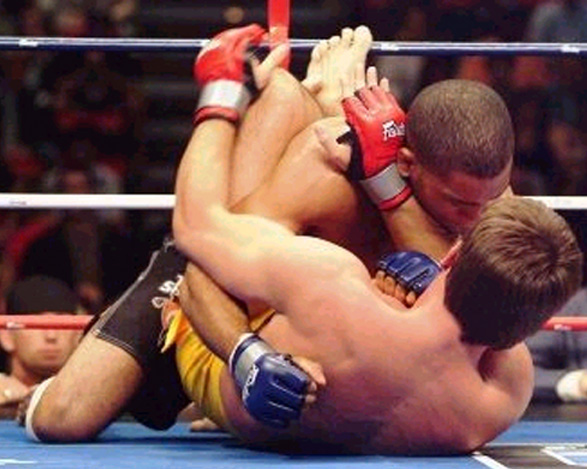


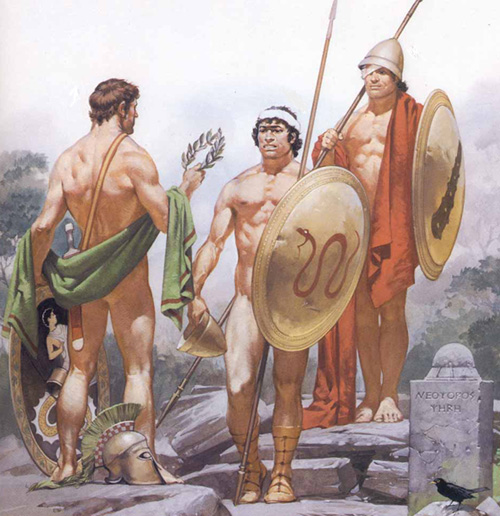
Fighting and Freedom are inextricably interconnected.
Here's the Spartan poet Tyrtaeus, ca 650 BC:
Let each man hold, standing firm, both feet planted on the ground,
biting his lip with his teeth, covering with the belly of his broad
shield his thighs and legs, his chest and shoulders . . let each man,
Closing with the enemy, fighting hand-to-hand with long spear or
sword, wound and take him; and setting foot against foot, and resting
shield against shield, crest against crest, helmet against helmet
let him fight his man chest to chest, grasping the hilt of his sword
or of his long spear.For the man is not brave in war, unless he endure seeing the bloody
slaughter, and standing close reach out for the foe. This is excellence, this is the
best and loveliest prize for the young man to win. A common good this,
for the whole city and all the people, when a man holds, firm-set among the
fighters, unflinchingly.....For it is a fine thing for a brave man to die, falling among the front-fighters,
fighting for his fatherland.....
NW says that war is an essentially naked endeavor.
We're told that human beings have been around for about 200,000 years.
For the bulk of that time, they didn't have much in the way of clothes.
When they fought -- and they did fight -- they fought nude.
For the Greeks, at least at first, that was still so.
Which is why Tyrtaeus says, "let him fight his man chest to chest."
Their chests and groins were bare.
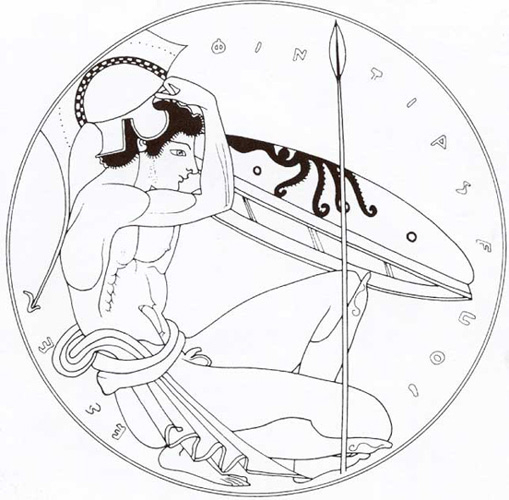
They wore helmets, and greaves on their lower legs, but the rest of the body was protected by the shield.
And when necessary, the fight was chest to chest.
That's how they thought, and that's how they fought.
Which is why, centuries later, another Greek named Philostratos would say that "They made sport training for war and war training for sport."
The sport was fighting.
Which is also why when, in the Thebaid -- the retelling of the ancient Greek epic Seven Against Thebes by the Roman poet Statius -- when, in the Thebaid, the Warriors hold Games -- Sacred Games -- and when they come to the boxing, the King says,
And now we need brave hearts; bring the grim gloves
For battle; here is valour most like war.
"here is valour most like war"
While, later in the epic, Statius says of a Theban Warrior:
He means to go
Where swords are thickest and the attack most pressed
And guard the walls he loves with naked chest.
Fight sport is naked; war is naked.
Skin on skin; chest on chest.
We know too that though death was not the intended outcome in boxing or pankration, the ethos for many of the fighters was "victory or death."
Let's go back to Tyrtaeus in the 7th century BC:
You are the unconquered blood of Herakles.
So be brave, fear not the number of your enemy
Stand straight in the front rank with your shield before you
and see your life as your enemy; the darkness of
death should be welcome as the light of the sun.
"the darkness of death should be welcome as the light of the sun"
It's harsh, but it's a recognition of what's necessary to preserve freedom.
It's interesting, in that regard, to note an exchange which took place recently between French Foreign Minister and humanitarian Bernard Kouchner, and the anti-war, and feminist, group, Code Pink:
Kouchner, French foreign minister, draws antiwar protesters in WashingtonBy Brian Knowlton
Published: September 21, 2007
WASHINGTON: For anyone still doubting the striking turnabout in U.S.-French relations, it was enough to see the reception Foreign Minister Bernard Kouchner got during a speech here before his meetings Friday with top Bush cabinet officials.
Kouchner, who made news this week by warning that a failure to resolve mounting tensions with Iran could mean war, had barely begun speaking Thursday in a crowded hotel ballroom when several antiwar protesters jumped up and unfurled pink banners that read: "Bush + Kouchner = Warmongers!" One woman tried to climb onto the stage.
Guards escorted the protesters away as they shouted, "No war with Iran! No war with Iran!"
More than one jaw dropped in the dark-suited crowd of about 400. Kouchner is a Socialist who joined the rightist government of President Nicolas Sarkozy and is also a founder of the Nobel Prize-winning humanitarian group Medecins sans Frontieres.
Kouchner, however, quickly took command. "But they are right," he told the crowd. As the chants continued from beyond the closed doors, he offered an undiplomatic, "But I agree, stupid!" drawing laughter. He directed the guards to let the protesters return.
The energetic 67-year-old minister then spent much of his speech - as he had spent much of the week - explaining what he meant last Sunday when he told a radio interviewer, referring to the crisis over Iran's uranium-enrichment work, "It is necessary to prepare for the worst," and "the worst, it's war."
On Thursday, as the surprised members of the antiwar group Code Pink filed back into the room, Kouchner said, "I'm not in favor of war with Iran, I want to prevent the war - so they were right!"
...
Kouchner repeatedly engaged the antiwar protesters - or they engaged him. When another Code Pink member stood and began shouting about Iran, he asked, "What do you propose?"
"Dialogue without sanctions," she replied.
He laughed. "That's been done," he said. "This is not, let's say, a very strong position."
So, Kouchner, a leftist and a founder of one of the world's great humanitarian groups, nevertheless recognizes that war -- and a credible threat of war -- is sometimes necessary to preserve freedom.
But unless those fighting for liberty are willing to die for liberty, the threat of war is not credible.
Which is what Tyrtaeus is talking about when he says that for those fighting for liberty,
"the darkness of death should be welcome as the light of the sun"
And it's a sentiment which is repeated by Statius seven hundred years later, as he describes the marshalling of the Men who will Fight against Thebes.
[There are warriors from] steep Taygetus
And hardy squadrons from Eurotas where
The white swans breed. The god of Arcady
Himself had reared them in the dusty ring
And trained them in the ways of angry war
And naked valour; hence their high resolve
And sweat the sacrament of glorious death.Parents are gladdened by their children's fate
And urge them to their doom; the young men all
Are shedding tears, the mothers well content
To lay the wreaths. Reins in their hands they hold
And javelins, a pair, with thongs attached;
From huge bare shoulders hangs a shaggy cloak,
Swans' feathers crown each crest.~ Statius, Thebaid, IV, 227-40
Let's deconstruct a bit.
Statius is describing the warrior contingent from Laconia which is accompanying Polynices and Tydeus on their quest to regain the throne of Thebes.
Laconia is the region of Greece of which Sparta is the chief city.
So the poet is basically describing Spartans.
And there are some allusions therefore to Sparta:
[warriors from] steep Taygetus [a mountain near Sparta]
And hardy squadrons from Eurotas [Sparta's principal river] where
The white swans breed. [Zeus came to the Laconian matron Leda in the guise of a swan and fathered the Spartan heroes known as the Dioscuri -- thus the swan is another symbol of Lakon.]The god of Arcady [Hermes]
Himself had reared them in the dusty ring [of boxing, wrestling, and pankration]
And trained them in the ways of angry war
And naked valour; hence their high resolve
And sweat the sacrament of glorious death.
Hermes -- the Roman Mercury -- has trained these guys in the ways of angry war and naked valour -- since they fight, that is, display male virtue, in the palestra, in the games, and in battle, nude --
and that training has given them high resolve -- "Never retreat, never surrender" is the Spartan credo --
"And sweat the sacrament of glorious death."
As I discussed in my reply to the Blacksburg message thread, the Greeks -- and also the Romans -- regarded a glorious death in battle as wiping "clean at one stroke all previous flaws in a man's life."
Then the poet adds that
Parents are gladdened by their children's fate
And urge them to their doom ["Come back with your shield or on it!"]; the young men all
Are shedding tears, the mothers well content
To lay the wreaths [the mothers of Spartan Warriors are content to do their duty; the young men are more emotional, and cry openly.]Reins in their hands they hold
And javelins, a pair, with thongs attached;
From huge bare shoulders [the Spartans claimed that the way they bred warriors, plus the agoge and the athleticism of their women, resulted in men who were bigger and stronger] hangs a shaggy cloak [the Spartan Warrior's single red cloak, which became "shaggy" from wear],
Swans' feathers crown each crest.
So this is Statius' take, writing ca 90 AD, on the Spartan ethos:
Naked valour, high resolve, and sweat the sacrament of glorious death.
What's the result of training Men "in the dusty ring" of boxing, wrestling, and pankration, training them there and elsewhere "in the ways of angry war / And naked valour" -- by raising them in small all-male groups which are encouraged to fight constantly?
In Sparta, the result was a constitutional state which not only guaranteed freedom and independence for its citizens, but in which Men flourished.
Here's the Spartan poet Terpander writing around the same time as Tyrtaeus, 650 BC:
The spear-points of young men blossom there;
And Justice is done in open air,
The stuff of gallant enterprise.
"the spear-points of young men" -- both their martial valour and their manhood -- "blossom there;"
"And Justice is done in open air" -- the city is governed by an Assembly which meets in the out-of-doors and whose doings are transparent --
"The stuff of gallant enterprise."
"Gallant enterprise" -- The Spartan Revolution and its attendant Eu-Nomia, its Good-Rule, are a gallant enterprise in the same way that the American Revolution and Constitution were a gallant enterprise:
the creation of Free Men who risked their lives, their fortunes, and their sacred honor to Fight for their Freedom.
This is a steady and recurring theme in Greek culture, and then in Roman culture:
Men flourish and live free when they are trained in the ways of naked valour.
Naked virtue.
Statius, who's Roman, says such Men are possessed of "high resolve" -- noble purpose.
Of course the Romans were eventually enslaved by their emperors.
But a Roman writer like Tacitus, who, like Statius, lived in and was oppressed by Imperial Rome, makes a clear connection between what we can call Nude Warriorhood -- and Manly Virtue.
For example, in writing about the Germans, whom he views as having retained the Warrior virtues which the decadent Romans of his day had lost, Tactitus notes that
They have only one kind of public show, which is performed without variation at every festive public gathering. Naked youths, trained to the sport, dance about among swords and spears levelled at them. Practice begets skill, and skill grace; but they are not professionals and do not receive payment. Their most daring flings have their only reward in the pleasure they give the spectators.
~ Germania, 24.
So -- what Tacitus is talking about is a manifestation of Nude Warriorhood; and he notes, approvingly, that the youths who participate in the sport, are not paid.
Rather, their reward is the pleasure their fellow Warriors derive from seeing this display of nude Warrior skill and naked Warrior courage.
Bravery.
And again, when Tacitus talks about naked youths dancing about among swords and spears, we can't help but be reminded of those lines of Statius we heard earlier:
He means to go
Where swords are thickest and the attack most pressed
And guard the walls he loves with naked chest.
So you have this recurring image of naked Men nakedly exposing their naked bodies to swords and spears.
Which it's suggested by both Statius and Tacitus, is one of, if not simply the, truest and bravest manifestations of Valour -- Warrior Virtue.
Again: his valour plain to see.
Genitals exposed in combat or in combat sport -- exposed along with the rest of the body -- equals Valour equals Manhood equals Masculine Virtue.
Tyrtaeus:
let him fight his man chest to chest, grasping the hilt of his sword
or of his long spear.For the man is not brave in war, unless he endure seeing the bloody
slaughter, and standing close reach out for the foe. This is excellence, this is the
best and loveliest prize for the young man to win. A common good this,
for the whole city and all the people, when a man holds, firm-set among the
fighters, unflinchingly.....For it is a fine thing for a brave man to die, falling among the front-fighters,
fighting for his fatherland.....
"let him fight his man chest to chest...
"This is excellence, this is the
best and loveliest prize for the young man to win. A common good this,
for the whole city and all the people..."
Now, Statius makes clear the connection between freedom and fighting in the very first fight in the epic, when Polynices and Tydeus meet and fight.
Stripped nude and hand-to-hand.
Hand-to-hand and Man2Man.
Both Men are armed.
They don't draw their weapons.
This is a ManFight.
Fought in Sacred Male Nakedness.
Fists bared.
Genitals bared.
That ManFight establishes their relationship, unites them in the comradeship of wounds, and sends them off together to battle the usurping tyrant, Eteocles.
Here's how Statius describes their fight:
First a brief pause for threatening words, then rage
Swelled as taunts flew, and both sprang to their feet
And bared their bodies and stood stripped to fight.Taller and towering stood the prince of Thebes,
Proud in his prime, but soul and strength no less
Supported Tydeus; in his tiny frame
Through every limb a greater valour reigned.Then, as they battle, blow on blow is struck
On face and forehead, thick as arrows fall
Or Arctic hail, and knees are flexed to bruise
Soft sides and loins. Like, when the years bring on
Jove's contests at Olympia and the dust
Is hot with men's raw sweat and, seated round,
Crowds urge the young lads on with rival cries,
And mothers wait outside to hail the prize,
So those two charged, fired by no love of fame --
Hate was the spur -- and deep into each face
The fingers scratch and probe and penetrate
Their flinching eyes.
"frenzy and bloodshed"
"stood stripped to fight"
"knees are flexed to bruise soft sides and loins"
"hot with men's raw sweat"
If, when looking at this picture,

you imagine these guys nude -- and bloodier -- they could be Polynices and Tydeus.
It's Fighting.
It's the same idea.
Or look at these guys -- Stephen Bonnar and Forrest Griffin:
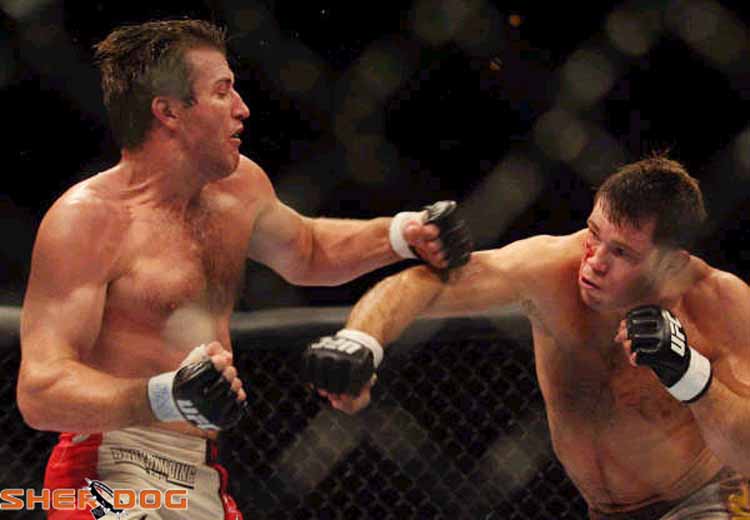
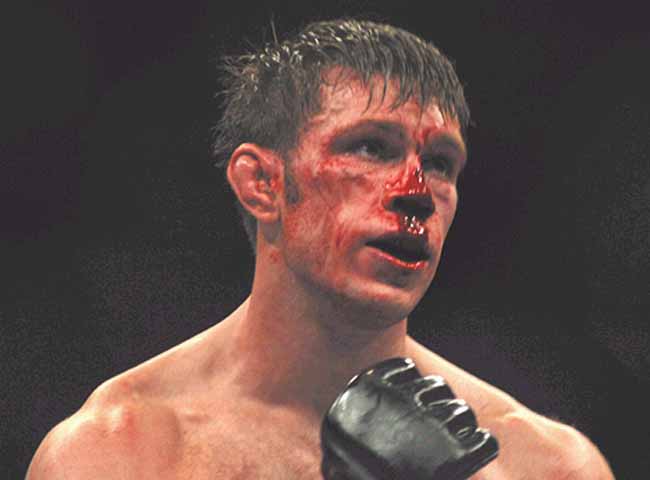
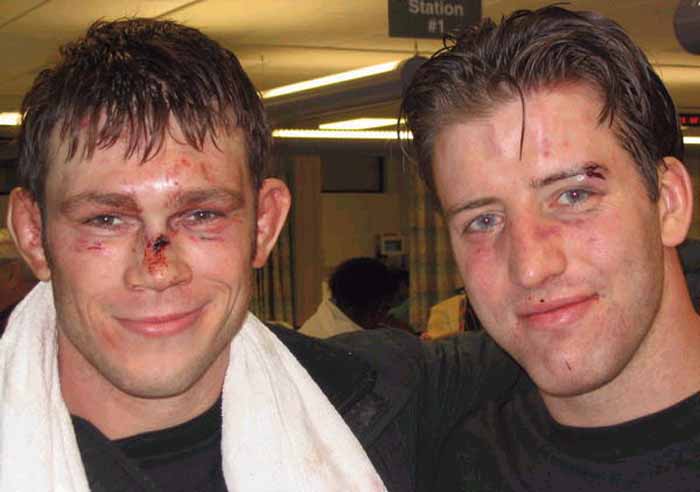
This is what Statius, via the king, calls the Comradeship of Wounds.
Which *may*, says the king, foretoken future love.

And that is what Polynices and Tydeus would have looked like after their fight, when the king had gotten them cleaned up and staged a banquet at which they could meet his daughters.
"Placed apart the two
Young men recline, their wounds now washed and dry.
Each sees the bruises on the other's cheeks
And each in turn forgives"
So this is not just poetry.
This is also reality.
Nor is this unique to Forrest and Stephen.
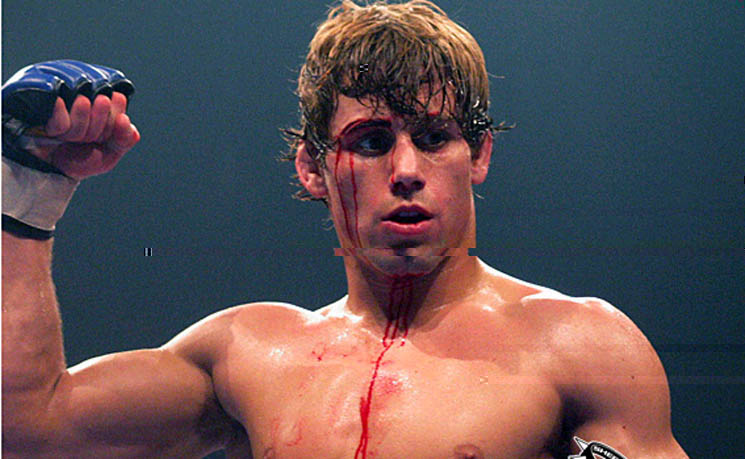
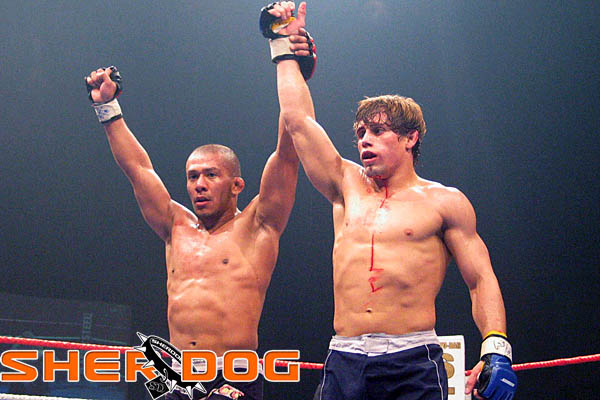
The Comradeship of Wounds.
Notice also that Tydeus, who's one of the greatest and most brutal of the Greek heroes, is described as having a "tiny frame."
That's based on the Iliad, which was written perhaps nine hundred years earlier.
In the Iliad, the goddess Athena approaches Tydeus' son Diomedes, and says
Tydeus got him a son who is little enough like him,
since Tydeus was a small man for stature, but he was a fighter ...
keeping that heart of strength that was always within him ...[Iliad, v 801]
Athena then persuades Diomedes to attack the war god Ares, who is, as it happens, his great-grandfather.
Diomedes, in other words, is a chip off the old block, and size doesn't matter.
The Greeks knew that it wasn't the dog in the fight, it was the fight in the dog.
Let's get back to Tydeus and Polynices, who are naked, bloody, and ardently kneeing groins while trying to gouge each other's eyes out.
They're interrupted in those endeavors by the king of Argos, who having come upon "a sight
Of terror, faces torn, cheeks bruised and smashed,
Streaming with blood,"

determines to make peace between them:
'Come now, have done with menaces that night
Or sudden wrath or valour prompted. Pass
Beneath my roof. Shake hands to prove your hearts.
There's meaning in this business and the gods
Are not aloof. Your present rage perhaps
Foretokens future love, a memory
To warm your hearts.' Nor were the old man's words
A vain presage. This comradeship of wounds
Issued in such fine trust as Theseus had
Who shared high risks with fierce Pirithous,
Or Pylades who, when Orestes' mind
Was gone, preserved him from the Fury's rage.
So then the turmoil in their hearts was soothed
By the king's words, as when the ocean's deeps
That winds have made their battleground subside,
Yet still in drooping sails one lingering breath
Is long to die, and both with a good grace
And hearts at ease entered the royal abode.
So: the king says, "Your present rage perhaps
Foretokens future love, a memory
To warm your hearts."
And that's exactly right.
I've often spoken of the true, manly, male bond being a passage through rage to love.
That's what happens here.
The king realizes that the coming of these men fulfills a prophecy about who will marry his two daughters.
He immediately prepares a feast; gets the guys clean and comfortable --
"Placed apart the two
Young men recline, their wounds now washed and dry.
Each sees the bruises on the other's cheeks
And each in turn forgives";

-- and brings in his daughters -- who he then gives them in marriage.
Now Polynices and Tydeus are related through marriage, and these brothers-in-law become true brothers of the heart and inseparable companions, as we see a few pages later:
[Polynices] hurried from the well-loved room to speak
Sadly to Tydeus, now his partner, now
Sharing each battle in his faithful heart,
So strong the love that bound them since they fought...
"sharing each battle in his faithful heart,
So strong the love that bound them since they fought"
The implication is inescapable: the love that binds them is strong because they fought.
The connection is clear: Fighting -- which is lubricated by Sweat -- "hot raw sweat" says Statius -- leads to the Warrior Bond -- which in turn leads to Freedom and Valour -- which is Manly Virtue.
And which is connected directly to Manhood both literal and metaphorical.
his valour plain to see, says Statius of another young Warrior who has stripped naked to compete in a race.
It's all connected and interconnected: Freedom, Manhood, Male Nudity, the Male Genitals, Male Virtue, Fighting, Sweat --
And of course Blood.
Sweat the Sacrament of Naked Valour.
Sweat the Sacrament of Glorious War.
War is Glorious to the ancients both because it gives Men the opportunity to display Valour;
and because it preserves Freedom.
And the connection between athletics -- and in particular fighting -- and war -- is explicit.
As I said, when the Warriors hold Games, and they get to the boxing, the King says
And now we need brave hearts; bring the grim gloves
For battle; here is valour most like war.

Monstrous to see and striking monstrous fear
Capaneus stood forth and bound on hands and
Straps of raw oxhide, black with studs of lead,
Himself no softer. 'Give me one', he roared,
'Of all these thousands! Would my rival were
A Theban I could rightly do to death,
And not stain my fine strength with Argive blood!'
They stood aghast and terror kept them dumb.At length from Sparta's naked ranks there sprang
Alcidamas, to their surprise, and made
The Dorian princes marvel, but his friends
Knew he'd grown up in Pollux' boxing-ring
And trusted in his trainer. Hands and arms
Pollux himself had guided -- limbs he loved! --
And sparring with him many a time admired
His matching fury and, exultant, snatched
Him up and pressed him naked to his chest.
So: the Spartans are naked -- as they would have been -- and from among them comes Alcidamas to answer the challenge.
Alcidamas has been trained by Pollux -- whom the Greeks called Polydeuces -- and was loved by him:
"many a time admired
His matching fury and, exultant, snatched
Him up and pressed him naked to his chest."
"matching fury" is what turns Pollux on.
He exults in it.
To the point of giving his student a big, hard, naked, hug.
The implication of course is that Pollux and Alcidamas were lovers.
What follows in the poem is an account of the sort of boxing which Statius and his readers would have seen at athletic competitions -- not gladiatorial games but true athletic competitions between free men -- in Rome:
Capaneus disdained his challenge, mocking him
As if he pitied him, and laughing called
For someone else, but forced at last to fight,
Faced him and anger braced his bulging neck.
Poised on tip-toe at their full height they raised
Hands thunder-charged, their faces safely tucked
In sheltering shoulders, watching all the while,
No way for wounds left open. Capaneus
Stood fierce and huge with his enormous frame
And far-flung length of limb, as though from Hell
The giant Tityos should rise, if the grim birds
Granted him leave. The other, still a lad,
Had yet matured in strength beyond his years.
His youth's fine spirit promised a great prime;
None wished to see him lose -- cruel bloody sight! --
And with a heartfelt prayer all feared the fight.Each measured up the other, hoping for
An opening; no blows yet in anger struck.
Fear for a while was mutual, caution still
Mingled with fury as they lightly sparred,
Glove rubbing against glove, the bright sheen dulled,
Both of them testing. Better trained, the lad
Postponed his onslaught and reserved his strength,
Fearing what lay ahead. But Capaneus,
Squandering, reckless, hurled himself, both hands
Flailing, teeth vainly grinding, towering up
To his own damage. But with skilled foresight
And all his country's clever vigilance
The Spartan dodged and parried, safe and sound
By ducking swiftly or deflecting each
Assault, feet pressing forward, face held back.And often too he met the unfairness of
His rival's strength -- such practised skill he had,
Such stalwart talent --- by a daring dart
Under his guard and then leapt up and loomed
High over him. As leaping breakers dash
Against a threatening rock-face and fall back
Broken, so he wheeled round his furious foe
Battling. He kept his leading arm outstretched
To threaten eyes and ribs, and tricking thus
His rival's guard implanted cunningly
A sudden hit, a wound that marked his brow.
Blood drawn! Across his temples a warm line!
Not yet aware, a sudden rolling cheer
Bewildered him, but when he chanced to wipe
His face with his tired hand and saw the red
Stripe on his glove, no lion raged so wild
Or tigress wounded by a hunter's spear.
He drove the young lad right across the field,
Gnashing his teeth in ghastly fury, till
The lad was toppling, almost on his back,
As whirling hands struck time on time. The blows
Were wasted on the wind or fell on gloves.
The Spartan, moving nimbly, warded off
A thousand deaths that showered on his head,
And swift feet helped, but he, his skill recalled,
Fought as he fled and fleeing still struck back.Now both of them are panting and distressed;
Pursuit is slower, flight is not so swift;
Knees fail the two of them, both stop and rest.
So roaming sailors worn by long sea-Ianes
Welcome the signal given from the poop
And rest their oars awhile; but rest scarce theirs
When to the oars they're summoned once again.A second frenzied rush! But he got clear
And, crouching, charged himself and Capaneus
Pitched on his head and as he rose the lad
Dealt him a wicked blow again and stood
Pale-cheeked to see his handiwork so good.The Argives shouted; never shores or forests
Gave such a roar. But when Adrastus saw him
Struggling to rise, shaking his fists, intent
On deeds insufferable, 'Quick', he cried,
'Quick, friends, he's mad. I beg you, hold him back
And bring the palm and prize. He'll never stop
Till the lad's skull is crushed into his brain.
Rescue the poor doomed Spartan!' In a trice
Tydeus sprang forward and Hippomedon
Answered his call. Those two with all their strength
Hardly restraining those two hands of his,
Pleaded, 'Stand back! You've won! It's a fine thing
To grant life to the loser. This lad too
Is one of ours, our comrade in the war.'
No bending that great prince! He thrust away
The palm and breastplate offered him and roared,
'Hands off in clotted grime and gore I'll crush
Those girlish cheeks with which he charms so well.
I'll send his body shapeless to the tomb
And give his Spartan trainer cause to mourn.'
He swelled with rage and claimed he hadn't won,
But his friends forced him back and, countering,
The Spartans praised their splendid son with cheers
And mocked those menaces with long loud jeers.
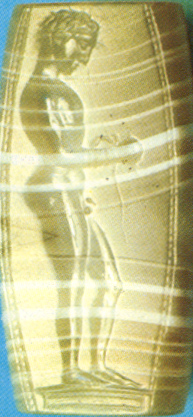
|
MAN to the max.
"A sudden hit, a wound that marked his brow.
Blood drawn! Across his temples a warm line!
Not yet aware, a sudden rolling cheer"
The first blood brings a roar from the crowd.
And the naked Spartans are indifferent to the loser's jibe about their champion's "girlish cheeks with which he charms so well."
They respond with cheers for Alcidamas and jeers for the sore loser.
The Spartans know what the relationship between Alcidamas and Pollux was about.
Because they've all been there.
And they know there's nothing "girlish" about it.
That's the point.
Alcadamus, like Pollux, is a masculine man who exults in the naked fury of the fight.
Alcadamus, like Pollux, is a Spartan.
Now, I've said that many Greeks admired the Spartans.
They may have been at odds with the Spartans politically and/or geo-strategically; and they were often at war with the Spartans.
But they admired Spartan ideals, because in truth, those ideals were in key areas identical to their own.
After all, the Greeks who gathered, under Spartan command, at Platea in 479 to finally face down the Persians took a formal oath:
'I shall fight to the death; I shall put freedom before life.'
I shall put FREEDOM before life.
Think about it:
Sparta: I shall put FREEDOM before life.
Thoreau: The price of anything is the amount of life you exchange for it.
Thoreau understands, but the Spartans put it more simply and plainly.
Sparta: I shall put FREEDOM before life.
And that's exactly and precisely what NW is talking about:
It is this Fundamental, Mythological Human mingling of blood and sweat, in one-on-one hand-to-hand battle which BOTH Men have experienced, which becomes the foundation on which all Free Men stand. Without it, society's freedom drifts away, like a matchstick on the sea, maybe not right away, but eventually it does. Fighting is Freedom; Fighting is Man.
FIGHTING -- and every Greek was taught how to fight one-on-one and hand-to-hand in the dusty ring of the palestra, the ring of naked valour where he experienced the Fundamental, Mythological Human mingling of hot raw blood and hot raw sweat -- is "the foundation on which all Free Men stand."
That foundation is both practical -- and "Mythological."
Remember that at Sparta the boys prayed at the shrine of the mythic hero Achilles before fighting:
On the road which leads northwards from Sparta stands a sanctuary built for Achilles by Prax, his great-grandson, which is closed to the general public;
but the boys who are required to fight in a near-by plane-tree grove enter and sacrifice to him beforehand.
~ Pausanias via Graves, The Greek Myths, 164.p.
Fighting is "the foundation on which all Free Men stand."
Fighting is Freedom; Fighting is Man.
And MAN is FREEDOM.
Which is why the MAN raised to fight puts Freedom before Life:
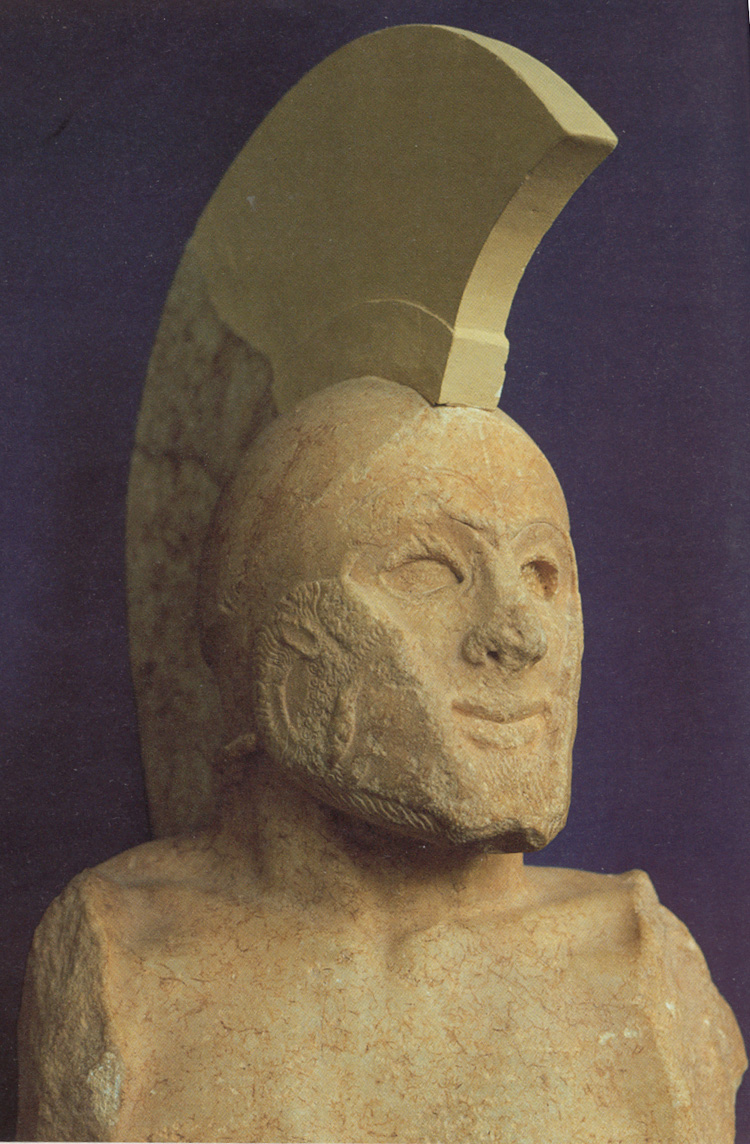
Leonidas of Sparta, ruled 491 - 480:
When the ephors said, "Haven't you decided to take any action beyond blocking the passes against the Persians?", "In theory, no," he said, "but in fact I plan to die for the Greeks."
When Xerxes wrote to him: "It is possible for you not to fight the gods but to side with me and be monarch of Greece," he wrote back: "If you understood what is honorable in life, you would avoid lusting after what belongs to others. For me, it is better to die for Greece, than to be monarch of the people of my race."
~ Plutarch, Sayings of the Spartans
Thank you NW.
You're a true Warrior.
Bill Weintraub
October 1, 2007
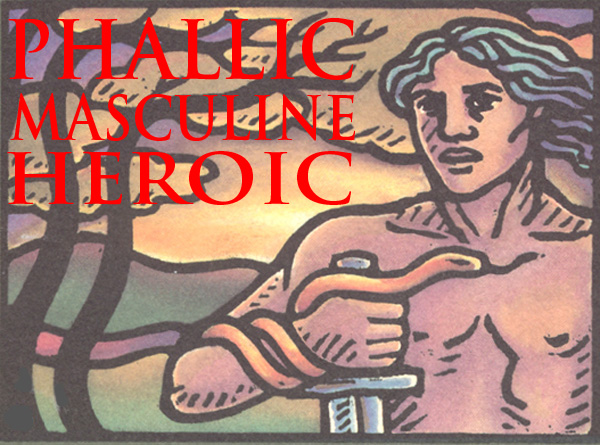



AND
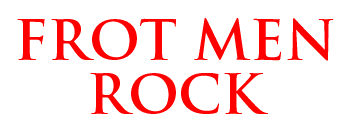
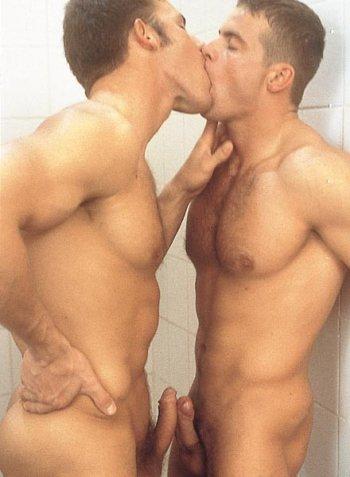
Warriors Speak is presented by The Man2Man Alliance, an organization of men into Frot
To learn more about Frot, ck out What's Hot About Frot
Or visit our FAQs page.

| Heroes Site Guide | Toward a New Concept of M2M | What Sex Is |In Search of an Heroic Friend | Masculinity and Spirit |
| Jocks and Cocks | Gilgamesh | The Greeks | Hoplites! | The Warrior Bond | Nude Combat | Phallic, Masculine, Heroic | Reading |
| Heroic Homosex Home | Cockrub Warriors Home | Heroes Home | Story of Bill and Brett Home | Frot Club Home |
| Definitions | FAQs | Join Us | Contact Us | Tell Your Story |

© All material on this site Copyright 2001 - 2010 by Bill Weintraub. All rights reserved.
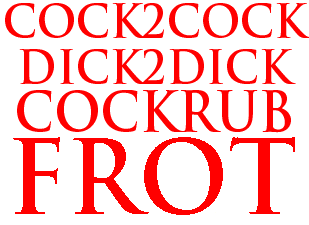

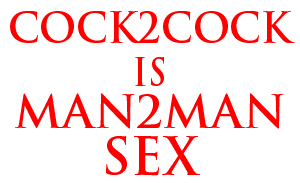

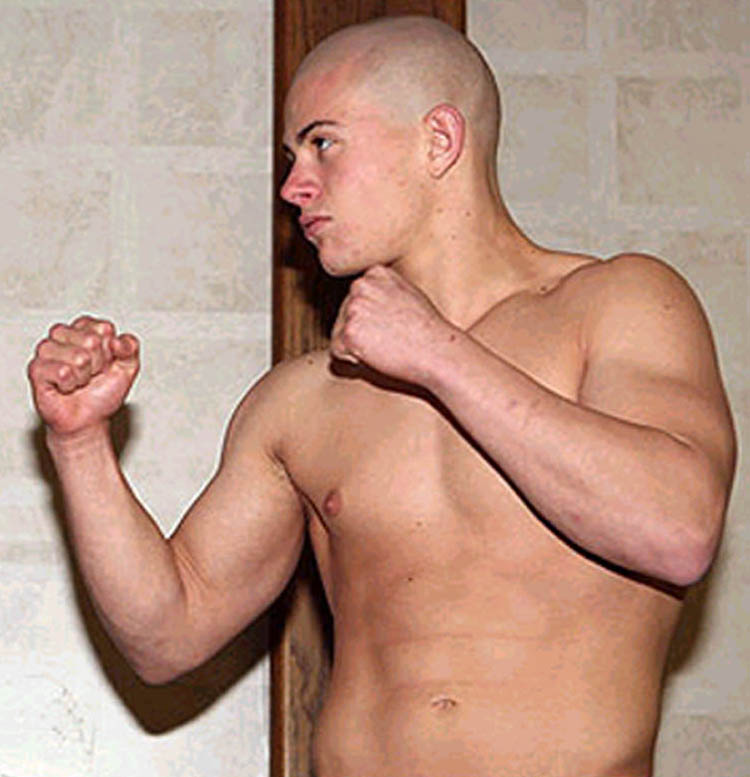
About this and other Mixed Martial Arts pictures:
Many of the Mixed Martial Arts photos in this post are from sherdog.com.
sherdog.com is highly recommended, and I urge and encourage you to visit sherdog.com and spend LOTS of time on that site.
And I want you to do that INSTEAD of going to porn sites.
And in particular analist porn.
Which is extremely destructive for MEN like yourselves.
What will visiting sherdog.com accomplish?
There's an old Marxist saying, usually attributed to Lenin, that "being determines consciousness."
And that's not complicated.
If you spend all your time looking at porn and the prostitutes who are employed by pornographers as models, that becomes your consciouness.
Likewise, if you spend all your time looking at buttholes and buttfucking, that becomes your consciousness.
Conversely, if you spend your time looking at fighters, at MEN who FIGHT, that becomes your consciousness.
Well before Lenin, Henry David Thoreau said it a lot better:
As a single footstep will not make a path on the earth, so a single thought will not make a pathway in the mind. To make a deep physical path, we walk again and again. To make a deep mental path, we must think over and over the kind of thoughts we wish to dominate our lives.
"To make a deep mental path, we must think over and over the kind of thoughts we wish to dominate our lives."
That means that it isn't enough to drop in on this MAN2MAN Alliance site once in a while and read an article or look at some pix, and then leave.
It means that you have to submerse yourself in this new way of thinking.
Looking at pictures of Fighters rather than pictures of male prostitutes.
Reading ancient literature whenever possible.
Reading and re-reading ALL the articles on this site, and most especially the articles in Warriors Speak -- of which there are now about 750.
And putting together Regional Chapters so that you can meet and help each other in real time.
Those are all things you can do which will help YOU -- enormously.
As will, of course, training in a fight sport.
Thoreau:
Do not worry if you have built your castles in the air. They are where they should be. Now put the foundations under them.
Thoreau:
If one advances confidently in the direction of his dreams, and endeavors to live the life which he has imagined, he will meet with success unexpected in common hours.







